LINK
 Einride Founders Robert Falck, CEO, and Linnéa Kornhed Falck, CMO and Deputy CEO, are taking on the UK with Einride’s ecosystem of digital, electric and autonomous shipping technologies.
Dedicated to the Swedish-British business community since 1906.
365
Einride Founders Robert Falck, CEO, and Linnéa Kornhed Falck, CMO and Deputy CEO, are taking on the UK with Einride’s ecosystem of digital, electric and autonomous shipping technologies.
Dedicated to the Swedish-British business community since 1906.
365
We are looking at re-architecting the industry from the ground up, by integrating an entirely new approach to all aspects of how goods move.
“
ABOUT THE SCC
The Swedish Chamber of Commerce for the United Kingdom is the ultimate platform for entrepreneurs and businesses within the Swedish-British business community. Founded in 1906 – by business and for business – we have represented, inspired and promoted our members, extended commercial relations between our countries, and delivered first-class services and events for over a century.
THE SCC TEAM
Fredrik Warneryd
Chief Executive
EVENTS AND PROGRAMMES
Timoteo Harvey
Sparbanksstiftelsen Finn Scholar
Ebba Nyström
Sten A. Olsson Foundation for Research and Culture Scholar
MARKETING AND COMMUNICATIONS
Jonas Eklund
Head of department
Saga Palmér
Marketing Executive

Maja Stenberg
Scholarship Fund for Swedish Youth Abroad Scholar
MEMBERSHIP AND COMMUNITY
Christoffer Waldemarsson
Membership & External Relations Manager

Patricia Malmström
Intern
BUSINESS SERVICES
Anna Crona
Head of department
Molly Bohlin Hedström
Gull & Stellan Ljungberg’s Foundation Scholar
Axel Olausson
Elof Hansson Foundation Scholar
Erika Wäreborn
Intern
CONTACT US
Swedish Chamber of Commerce for the UK
Sweden House, 5 Upper Montagu Street, London W1H 2AG
+44 (0)20 7224 8001, info@scc.org.uk
Swedish Chamber of Commerce for the UK
SCCUK
2
Dear members,
After months of darkness and the delayed arrival of higher temperatures, we were close to thinking (against better knowledge) that the seasons wouldn’t shift. Each time we believed summer was around the corner, the temperature suddenly dropped, and the sky turned sombre. Meanwhile, the international and the financial forecasts have been as gloomy (and unpredictable) as the weather. For some business leaders, this has sparked frustration, impatience, and feelings of hopelessness. Yet, as the recent heatwave reminds us, winter will always turn to spring and spring to summer; no situation is eternal.
This is also true at the Swedish Chamber of Commerce, as we are preparing to make some significant changes of our own. After six years of excellent service, Jan Olsson stepped down as SCC Chair at the Annual General Meeting, along with Board members Björn Savén (IK Partners), Niko Ek (Scandinavian Airlines) and Alex Marsh (Klarna). Meanwhile, the team will soon have to say goodbye to our brilliant scholars and invaluable interns, who are leaving the Chamber in mid-June.
Luckily, when one door closes, another one opens – and the SCC is pleased to welcome a new cohort of aspiring scholars to the team, and excited to start writing a new chapter under the Chairmanship of IKEA’s Peter Jelkeby. We are equally delighted to welcome our newest additions to the Board; Vattenfall’s Lisa Christie, EY’s Carl Pihlgren, H&M’s Henrik Nordvall and IK Partners’ James Yates, as well as our newest members, ABBA Voyage, Dania Scandinavian School, EIP Europe, Headland, Khraft, Lepaya, Mediaflow and Padium to the community.
In this issue of the Link, we continue our Swedish Business Footprint in the UK series, by visiting the North East and meeting with the local SCC Chapter Chair Caroline Theobald CBE, as well as with Essity and Invest Newcastle. As part of our Ecosystem Exchange: Life Sciences-programme, we’ve also had the privilege of visiting Cambridge’s world-renowned research cluster, and meet with businesses such as AstraZeneca. Furthermore, we look into Sweden as a holiday destination, learn about communication, law, and security, and dive into Einride’s groundbreaking logistics solutions.
On behalf of myself and the SCC team, I wish you a pleasant reading and a happy summer.
Fredrik Warneryd Chief Executive Swedish Chamber of Commerce for the UK
3
Content 26
SCC North East Chapter Chair
Caroline Theobald CBE, is on an ongoing journey with Sweden

The value Swedish businesses, such as Husqvarna, Essity, and IKEA, bring to the North East goes far beyond profit. “I think it’s about people, and it’s also about the cultural values which they disseminate in and through the places where they are based and the people that they employ.”
After six years of leading the SCC Board, Jan Olsson is
changing Chair
During his six years as Chair of the Swedish Chamber of Commerce, Jan Olsson has navigated the community through Brexit, COVID and now the rising inflation. Now, as the Chairmanship is about to come to an end, we sat down with him to speak about his highlights, insights and what’s next in store.

4
30
08
Swedish businesses looking to the North East: How Sweden became the North East’s third highest source country for foreign direct investment projects.
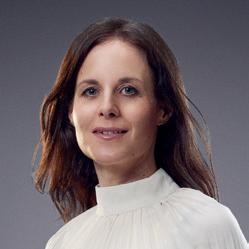



10
Essity Apprenticeship Academy: Essity’s AEL certified on-site engineering programme with job-guarantee after completed apprenticeship.
Cambridge Biomedical Campus: Meet Astra Zeneca and other businesses behind the world-renowned R&D region. 20
When cyberattacks strike: Murphy Solution on how businesses should prepare for and prevent cyberattacks. 26


36
Revolutionising legal processes: Get on top of your legal processes and free up time to unlock the business’ full potential.
The Right Kind of Loud: Learn how to break through the noise by using efficient communication. 42
Destination Sweden: Why more curious travellers are heading to the north of Europe. 46

THE LINK 365
5
EDITORS: Jonas Eklund, Saga Palmér, Annabel Daisley
COVER: Einride Founders Robert Falck, CEO, and Linnéa Kornhed Falck, CMO and Deputy CEO
PHOTO: Einride










MEET THE PATRONS



The patronship of the Chamber consists of a core group of member businesses, all committed to the long-term support of the Swedish-British business community. The patrons are advocates for the members of the Chamber and in return, the patronship comes with a range of added benefits, exclusive access and invites as well as extended marketing and networking opportunities.




Founded in 1992, the patronship has grown steadily and consists today of a vast number of member businesses that represent a wide range of industries, from the financial sector and manufacturing, to retail and tech. The patrons reflect the strength of the Chamber’s business platform and represent some of the largest brands in Swedish-British business.











7
SWEDISH BUSINESSES LOOKING to
THE NORTH EAST
Sweden is the third largest foreign investor in the North East of England. Long-standing home to Swedish household brands such as Essity, Husqvarna and Handelsbanken, the region has seen recent investments from Swedish games giants Thunderful Group and Amplifier Games, as well as the establishment of LeoVegas UK office in Newcastle, the regional capital of the North East. We spoke to Sam Cassidy, Senior Inward Investment Manager at Invest Newcastle, about why Swedish businesses are looking to the North East when investing in the UK.
In the past ten years or so, the city has really developed. Particularly along the River Tyne there has been a real riverside renaissance.”
Coming from a history of heavy industries with shipbuilding along the Tyne and home to George Stephenson, renowned as the Father of Railways, Newcastle upon Tyne, or simply Newcastle, is slowly but surely revealing another side of itself. “In terms of what has changed recently, a lot of those businesses have pivoted,” Sam Cassidy, Senior Inward Investment Manager at Invest Newcastle explains. “We are seeing a lot of subsea infrastructure and renewable energy companies along the river. A lot of that innovation has changed from shipbuilding into these kinds of industries of the future.”
In 2000, the new Millennium footbridge connected Newcastle with its neighbouring city Gateshead on the other side of the Tyne, followed by the opening of cultural institutions such as the Sage and the Baltic Centre for Contemporary art, which have all been key investments
in driving further development along the river. “We have seen real change in how the city looks from that perspective, and the investments in the region are really changing perceptions of the area – and driving further investments.”
Hidden gem
While the number of visitors coming to the North East has been one of the lowest among the UK regions in the past, investments in for example the Newcastle United football club and a future riverside conference arena will all be pulling further events, conferences, and music gigs to the region. “When you look at Barcelona and London –Newcastle is going to be alongside those cities and driving those major events, which is really exciting.”
Along with a major investment by the BBC and an increasing density of business, including a new HMRC office complex creating 9,000 jobs by 2027, Sam is hoping that this development will help to put the region on the map.
Continue readinge about the Swedish investments and initiatives that are contributing to the development of the region on pages 11-13.
TEXT: JONAS EKLUND | PHOTOS: UNSPLASH, INVEST NEWCASTLE
8
“
In the North East, Sweden is the third highest source country for foreign direct investment projects, after USA and Japan.
No.3
REGIONAL FACTS SHEET
Population: 2.7 million
Major cities: Newcastle, Gateshead, Middlesbrough, Sunderland.

Key industries: Manufacturing, renewable energy, tech, games and life sciences.
Universities: 5 universities in the region, including the Universities of Durham, Newcastle, and Northumbria.
Travel: Main airports are Newcastle Airport and Teeside International Airport. The East Coast Main Line provides fast train connections to both London and Edinburgh.

9


“I think Newcastle is a hidden gem. There are opportunities here that I think are missed by businesses who might consider other cities. We have a lot of skilled people who businesses can utilise as part of their investment and part of their business purpose.”
Recent devolution deal – a milestone for the region
Recently, the North East signed a major devolution deal with the UK government, transferring powers and a £1.4bn investment fund over 30 years to the region. “The deal will finally bring the North East under one combined authority, which is a really big opportunity and a milestone for us as a region, because it gives us the ability to invest in areas which will really drive growth and support local residents.”
Real optimism
Sam says that he can sense real optimism and that the devolution deal, together with the ambition to transform Newcastle into a cultural capital of the North East, is encouraging more people to stay in the region. “Creating those job opportunities gives local residents a chance to work in those higher paying high-skilled careers that are going to drive economic development within the region.”
Tapping into the region’s research power
The North East region boasts five universities with some 110,000 students in total. Almost half of them are STEM students, which Sam points out are “subjects of the future”. And they are not just about educating students: “The three universities of Durham, Newcastle, and Northumbria together, are ranked as the highest research power outside of London. In terms of looking at what that means for businesses, there’s a huge opportunity for businesses to engage with that research power.”
Emerging opportunities
Apart from renewable energy, digital, tech and games, life sciences is another growing sector to keep an eye on. With an NHS Trust running a large number of clinical trials, particularly in healthy ageing and wellbeing, as well as the National Innovation Centre for Ageing sitting in the Newcastle Helix innovation cluster, there are plenty of opportunities for businesses to engage in the longevity economy.
Recently, Recharge Industries took over Britishvolt’s gigafactory in Northumberland, and with Nissan’s £1bn flagship electric car hub in Sunderland, new supply chain opportunities are emerging around electric vehicle and battery production.
Sweden punching above its weight
Sweden is the eighth highest source market for foreign direct investment into the UK. In the North East, Sweden places third, after USA and Japan. “In terms of punching above its weight, Sweden does that brilliantly.”
“We have some great businesses here who we work with quite closely from an investment perspective, foremost in the digital and tech sector and particularly within games,” Sam says, mentioning Silent Games that was recently acquired by Swedish Amplifier Games and LeoVegas that established its UK office in Newcastle not long ago. “Then we have some excellent manufacturers like Essity, as well as digital construction company Byggfakta Group.”
Sam considers the Swedish business community as well developed in Newcastle and in the North East, which was confirmed by the recent Swedish Business Footprint event in Gateshead organised by the SCC, in collaboration with Invest Newcastle. “It was great to see all those businesses in the room together, and what they’re doing with the local residents in terms of upskilling and connecting with the community. Being a part of that business ecosystem is really important when we see foreign companies coming into a region.”
Warm and welcoming Geordies
In 2021-22, the North East had the highest level of job creation from foreign direct investment outside of London, which has transformed Newcastle into a truly international city. “We are at the forefront of seeing new businesses and new people come to the region,” Sam says. “Us ‘Geordies’ love new opportunity, we love new businesses, and I think that makes it particularly elan for foreign businesses to look here. And when they do come here, they can plug straight into the ecosystems and generally benefit from the warm welcoming Geordies.”
11
LINKING EDUCATION WITH INDUSTRY
SCC patron Essity is throwing out the rulebook on how to deliver a traditional apprenticeship, as it in November last year launched a new state-of-the-art Apprenticeship Academy carried out on-site at its mill in Prudhoe. “Our purpose is to increase skilled manufacturing numbers and raise the standard of apprenticeship delivery in the region,” says Clare Stewart, HR Manager for Essity Prudhoe Mill, and one of the driving forces behind the project.
Clare Stewart is the site HR Manager for Essity Prudhoe Mill, situated in Northumberland in the North East of England. “I joined the organisation in June 2021 and I am about to celebrate my 2-year anniversary with the business.”
With around 400 employees, Essity Prudhoe Mill is the second largest employer in Northumberland. It is a fully integrated site which recycles, produces, converts, and distributes paper products such as Plenty Kitchen Towel, Cushelle toilet paper and Tork hand towels. “The site
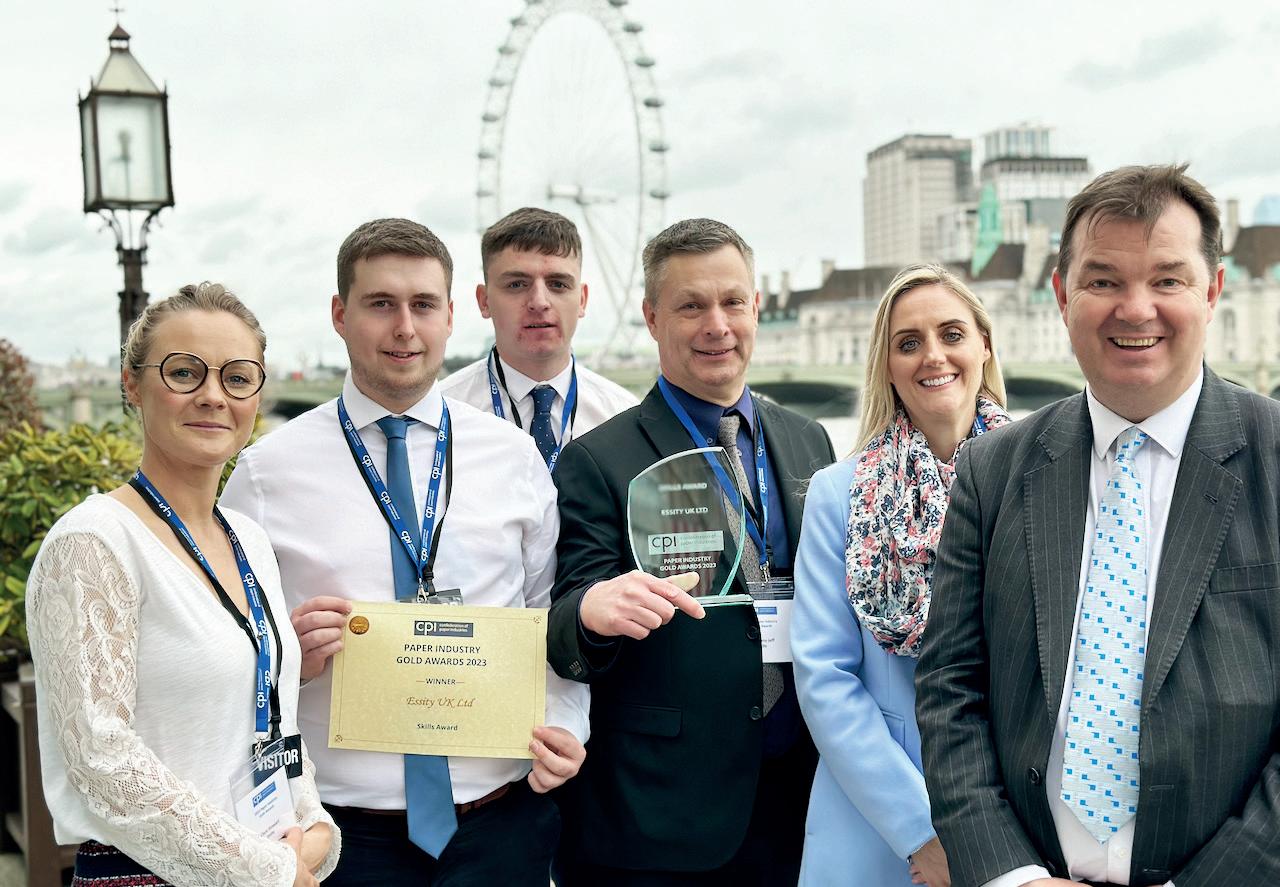
12
Recently, the Essity team received a major national award for the Apprenticeship Academy, at a ceremony at the House of Commons. Pictured with Hexham MP Guy Opperman are (left to right) Essity’s Clare Stewart, Max Russell, Sam Tilney, Anthony Jeff and Catriona Carson.
TEXT: JONAS EKLUND | PHOTO: ESSITY
celebrated its 50-year anniversary in August 2022 and has a rich history in the area, employing a large number of local people and families alike,” Clare says.
Supporting the young community
In the wake of COVID-19 and the pandemic’s effects on society, Clare describes how many of the local young people’s education, social interaction, and enlightenment of future career or academic choices were affected, leading the team at Essity to consider how they could support the young community. “We wanted to improve our impact within the local education landscape ensuring that those choosing an apprenticeship received the best training and education to carve a solid foundation for a successful career in manufacturing and engineering.”
After more than 12 months of preparations, Essity announced its new bespoke apprenticeship academy in November last year. Designed in close partnership with EAL – the specialist awarding body for engineering and manufacturing qualifications in the UK – the programme delivers academic and practical training on-site at Essity’s Prudhoe Mill, aiming to increase competition for skilled engineers and process operators in the UK paper making industry. “We wanted to ensure that we were linking education with industry in a way that would help all young people regardless of privileges, disability, or protected characteristics, to understand all options to make the right choices for their future career prospects,” Clare explains and continues: “Furthermore, we wanted to create a pipeline of home-grown talent within our organisation securing the future of our mill and showcasing fantastic job opportunities in the rural parts of Northumberland.”
More efficient than traditional methods
First of its kind in the north of England and the first in papermaking operations, the apprenticeship scheme is designed to be more efficient than traditional methods. Instead of apprentices spending substantial amounts of time away from the business at college and partly on the job, they will be fully trained on site within a bespoke training academy and learning from highly trained staff on the manufacturing line using technology with industry specific equipment.
The academy features a state-of-the-art workshop facility with equipment such as motors, conveyor, gear boxes and electrical panels to simulate real-life problem-solving on equipment the apprentices will be using in the working environment. “We have engaged all our apprentices and workforce in a way that they now enjoy learning, they thrive
in the operational environment as they have learnt valuable transferable skills which they apply day in day out instead of a standard programme delivered to a group of people all working in different industries. One of our ex-apprentices who is now mentoring some of our new ones said, ‘I wish I had been doing an apprenticeship now as it is exactly what an apprenticeship should be.’ This in itself is the exact outcome we were aiming for.”
Working closely with the educational landscape
The project has enabled Essity to work closely with the educational landscape and provide monthly taster days for students at local schools, including SEND (Special Educational Need and Disabilities) and SEMH (Social, Emotional and Mental Health) students. “The days focus on supporting young people in learning new skills and giving them a flavour of what life in industry is like, thus inspiring more people to choose manufacturing and apprenticeships as a career development option.” And so far, the taster days have proven to be successful – apart from positive feedback from school management, eight out of eleven students attending one of the latest taster days at Prudhoe High School subsequently applied for the 2023 September apprenticeship intake.
Guaranteed full-time positions
Upon completing the programme, apprentices are guaranteed a full-time permanent position with the company. “This is to ensure we have fully trained and skilled employees with the right behaviours and the ‘Essity values’ our business promotes, ready to become an asset to the business from day one.”
Throwing out the rulebook
By throwing out the rulebook around traditional apprenticeship delivery, Clare says that Essity’s approach aims to raise the standard of provision locally and within its industry. “Bringing our training programme in-house for process and technical operators will create new job opportunities for local people that offer apprentices a practical alternative to further education or even a change in career path.”
Clare hopes that the academy will inspire a new generation of process operators and engineers, especially women, to see apprenticeships as a rewarding and worthwhile career with genuine prospects. “The Apprentice Academy will train apprentices from all age ranges on process and technical engineering pathways in two intakes a year - in September and March. It is our ambition by 2025 to have an all-female apprentice cohort in one of our intakes.”
13
STRONG BUSINESS CASE BETWEEN THE NORTH EAST AND SWEDEN
TEXT: JONAS EKLUND
The North East of England and Sweden have a rich mutual history, cutting across the bounds of culture, friendship, business and trade. Both geographical proximity and a great cultural match have laid the groundwork for a strong relationship to develop. Husqvarna, IKEA and Essity, are only a few of the Swedish businesses employing thousands of people and making a mark beyond economic growth in the region. “I think all of them have brought Swedish culture alive. Through their factories and their stores, they have actually given people an insight of what it might be like to live and work in Sweden,” says Caroline Theobald CBE, SCC North East Chapter Chair and Managing Director of Bridge Club Ltd.
Ihave the privilege of being the regional Chapter Chair of the Swedish Chamber of Commerce for the UK in the North East, but my day job is Managing Director of Bridge Club Ltd, which does what it says on the tin,” says Caroline Theobald CBE. “We specialise on connections that make a difference. Those could be between startups and money management or access to new markets. It could be business to business, or business to new opportunities. In my view, all opportunity starts with a conversation.”
On a journey with Sweden
Caroline has been on a journey with Sweden since she was appointed Honorary Consul of Sweden for the North East and Cumbria in 2007. “I have retired from that role now, but when I was appointed, my objective was to create SwedishBritish opportunities, specifically in culture, education and business, because that is what I do in my day job.”
In 2008, a collaboration between the North East region and three national Swedish government departments was formed, called the ‘Seagull Project’, aimed to explore cross-border business opportunities in life sciences, digital and ICT, and clean tech. “What I developed was a cultural dimension based on the thinking that culture and creativity is the glue that holds society together – it’s something everyone can enjoy and benefit from.”
It wasn’t before long that Caroline’s relation to Sweden deepened even further. “In 2010, we opened the North East Chapter of the Swedish Chamber, and in 2012, we started what has become known as ‘Creative Links’, which is a partnership
led by culture and creative industries in the North East of England and region Västra Götaland in Sweden.”
Strong ties between the North East and Sweden
Sweden and especially the North East region of England have very strong ties historically. “Swedes have been coming here for a very long time, not necessarily always in friendship,” Caroline smiles referring to one of the very first Viking attacks on English soil taking place on the North East coast in the 790s. “But there are historically very strong ties.”
“And if you think about the geography, where the North East is, particularly in comparison to West Sweden and region Västra Götaland, it is no surprise that the groundwork was there for a strong relationship to develop.”
Similarities between the North East and West Sweden
Caroline mentions a study being commissioned in 2009, looking at the socio-economic backgrounds and regional similarities between the North East and Västra Götaland. “Both the North East of England and region Västra Götaland in particular, have reborn from heavy industry and redefined themselves along the lines of the sectors I mentioned before; life sciences, digital and ICT, and clean tech, and I would add tourism to that, which is a big industry.”
Many Swedish businesses in the region
At present, there are more than 30 Swedish businesses present in the North East spanning all sectors, from advanced manufacturing, to digital, cultural and creative.
“ 14
“The Swedish investors are very active here, but outside the region, people just don’t know about it.”
Caroline brings up Husqvarna as one of the major Swedish businesses in the region, headquartered in County Durham where they employ around 800 people. “They call themselves the oldest startup in the world and have a mission driven by innovation and new technologies. They are really making a contribution to the North East.” IKEA, with its store in Gateshead, is another example of a Swedish business leading on culture, values, EDI and sustainability. “And then of course Essity, that has made an enormous investment in Northumberland to create their own future by setting up one of the first on-site apprenticeship schemes in England.”
“It is quite remarkable what Swedish companies are doing here. When you have iconic businesses like these, they can act as a magnet for others who might form their supply chains here.”
Cultural similarities
A recent study performed by Time Out ranked Newcastle the fourth best place to work in the UK. “But that doesn’t take into account some of our wonderful scenery – the beaches, mountains, and the balance between city and rural – something that is quite important to Swedish people,”
Caroline says and continues: “I suppose their investment record here speaks for itself. Last year, there were five investments in tech businesses that I know about. Some of
them are quite big and interesting, like Swedish Amplifier investing in Silent Games, because the cultures were similar. But they could also see that there's an opportunity to use the North East as a launch pad to other global destinations.”
Bringing Swedish culture alive
Caroline is determined that the value Swedish businesses bring to the region goes far beyond business and profit. “I think it's about people, and it's also about the cultural values which they disseminate in and through the places where they are based and the people that they employ. I think all of them have brought Swedish culture alive. Through their factories and their stores, they have actually given people an insight of what it might be like to live and work in Sweden.”
It's all about people
One of Caroline’s legacies from her time as Swedish Consul, is a Swedish garden in Gateshead, celebrating the West Swedish and East of England coastlines, built with the help of Husqvarna among other Swedish-British businesses. The garden is part of the National Garden Scheme, a UK wide organisation raising money for charity and giving people access to gardens that they would normally not see. “The garden is actually about friendship. What I wanted to do was to create a place which summed up what happens when great trading nations or long-term friends work together. It’s all about people, about sustaining relations. To me, it's just as important as business-to-business ties.”

15
REVOLUTIONISING ROAD FREIGHT IN THE UK
Einride is looking to re-architect the whole freight industry with its end-to-end ecosystem of digital, electric, and autonomous shipping technologies. Now, the market provocateur is taking on the UK by introducing its first commercial partner, PepsiCo. The Link sat down with founders Robert Falck, CEO, and Linnéa Kornhed Falck, CMO and Deputy CEO, to discuss why the industry is in desperate need of change and how they can facilitate for the UK to make the “big switch”.
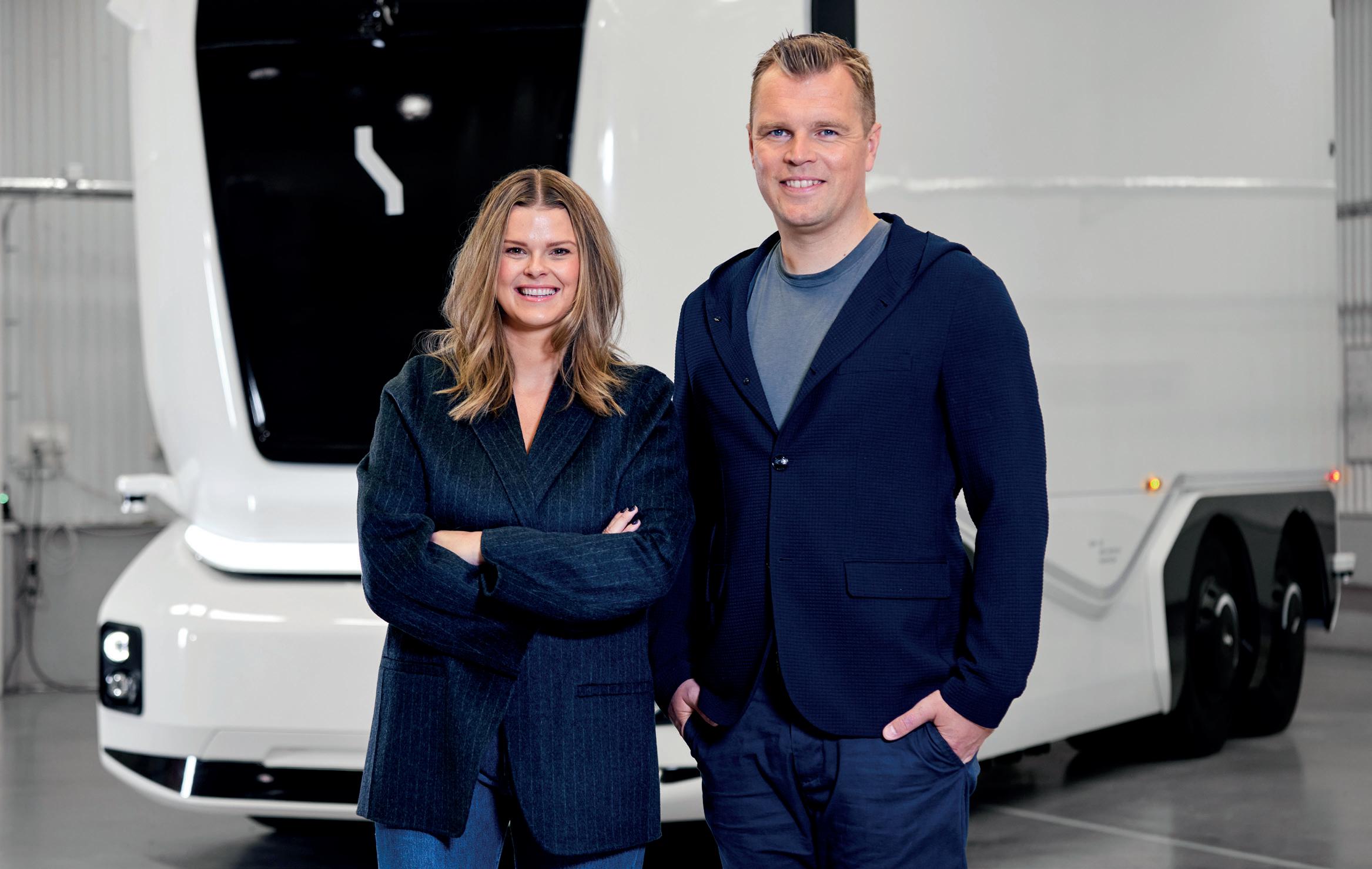
Spending many years in the transport industry before founding Einride in 2016, Robert, who is also the company’s CEO, describes how he was shocked to see how the traditional transport industry across markets was unwilling to change its ways and embrace new technology. “They were not looking into sustainable solutions but instead, prioritising what would provide the best economic outcome. The industry’s pace of innovation has more or less stagnated and is now at record low levels. It is unable to take itself to the next level.”
With Einride, the founders are looking to digitise, electrify and automate the freight industry. “We are looking at re-architecting the industry from the ground up, by integrating an entirely new approach to all aspects of how goods move. For us, it is so important to tell a different narrative and prove that you can combine electric and autonomous technologies, and that the future does not have to be dependent on fossil fuels,” Robert says.
16
TEXT: JONAS EKLUND | PHOTO: EINRIDE
Full end-to-end solution
According to Linnéa, CMO, Deputy CEO and Founder, there are currently no competitors to Einride on the market. On the broad landscape of electric and autonomous vehicles, there are companies tapping into various singular opportunities, but Einride is the only actor covering and mapping the whole ecosystem, using four key elements: the intelligent platform Einride Saga, electric and autonomous fleets, charging infrastructure, and connectivity networks. “We stand apart by providing a full end-to-end solution in the transportation of goods that is sustainable, cost effective, transparent and high performing,” Linnéa says. “Our freight mobility solutions for electric and autonomous mobility consist of capacity as a service (CaaS) and software as a service (SaaS), enabling a first-of-its-kind ecosystem and a resilient shipping future.”
Making a splash in the UK Einride made a big splash when announcing its UK launch in April this year. Back-to-back interviews with Sky News, the BBC, and a room packed with industry stakeholders at the launch event, all bear witness to the inclination that this could very well be the “big switch” the market has been waiting for. “Our launch comes at a time when the UK Department for Transport is looking to build a sustainable future of freight, where goods are moved through cost-efficient, reliable, resilient, seamless and net zero means – a vision that Einride shares,” Robert says.
As the sector is emerging from its operational challenges of recent years, and at the same time managing today’s issues such as driver shortages, it seems indeed that Einride is in the right place at the right time. “Through digitalisation, automation and electrification, we can help dramatically reduce costs, delivery times and emissions. The UK must now look to the future and meet the opportunities and challenges of the transition to net zero, ensuring it has the right skills, people and technology to succeed.”
Partnering with PepsiCo
As part of the launch, Einride presented its first commercial partner, PepsiCo, for its UK grid in the heart of the Midlands, also known as the “golden logistics triangle” due to its strategic location. Initially, PepsiCo will transport goods from its Walkers manufacturing sites in Leicester and Coventry with Einride’s connected lorries. Over the first three years, the deployment will reduce CO2 emissions by an equivalent of 1,623 tonnes. “PepsiCo’s transportation flow between factory sites in Coventry and Leicester is an ideal starting point for electrification and to prove the concept over an initial three-year partnership, with the goal to better understand the role electric lorries can play in PepsiCo's transport operations,” Robert says. “We’re proud to partner with such an ambitious partner as PepsiCo’s Walkers, who are committed to reaching net zero emission by 2040.”
Rebuffing myths
Linnéa recalls when first starting Einride, she would constantly hear that haulage can not be done with electric lorries. “The fact that we are now live in eight markets and scaling operations has proved that yes, of course you can. It’s one big myth that we have rebuffed.” Other misconceptions include thinking that the battery is too heavy or worries around what Linnéa calls “range-anxiety”. “The real fact is that most transport doesn’t happen in those long ranges, across entire countries. The day-to-day reality of haulage is made of shorter distances and a low complexity environment, which is specifically notable here in the UK. We need to rethink transport and leverage intelligent movement to go electric. This is what the ‘big switch’ means to us.”
No electric without digital
To make the big switch and achieve a business case with the full potential of electric haulage, all ingredients must be in place. “One aspect we can’t highlight enough is that you can’t go electric without going digital. You can have charging infrastructure in place, a fleet ready to be used but it won’t work without the digital interface,” Linnéa explains.
To enable this transition for its customers, Einride’s approach is to always start with an actionable assessment of electrification opportunities. A successful roll-out rests on knowing where there is electrification potential within the network, deciding where to install electric capacity and where to deploy lorries – and knowing how to expand or scale fleets, in line with emission- and costsavings goals. “Through our intelligent freight mobility platform, we can do just that. We provide businesses with a tailored, end-to-end assessment of how to electrify operations for minimized cost and maximized efficiency and environmental benefit.”
Incentives to go electric
In most countries where Einride is active, there are larger government subsidies available than in the UK. Robert witnesses an increasing demand from customers to electrify freight transport, but that it is difficult to make the transition to electric possible entirely without subsidies. “The shipping industry faces thin margins and the initial investment in electric transport and the accompanying infrastructure can seem a bit daunting. However, if there are no incentives for the switch, there is a risk that available electric trucks will move to markets with available subsidies, since that's where shippers can get the best business case for electric transport. As we take up our local operations, we're committed to making this market a key player for those looking to go electric by partnering with the right parties within the UK,” Robert says.
17
Discover getyourup and gå

now available in Tesco

IN OTHER NEWS
EY named Europe Climate Leader 2023

SCC patron EY was recently recognised by the Financial Times and Statista for its efforts in reducing greenhouse gas emissions. As one of the leading companies in Europe, EY is carbon negative for the second consecutive year in 2022 and is aiming towards becoming net zero globally by 2025. Actions taken include less air travel emissions and electricity consumption, as well as collaborations with clients and other organisations. “Transitioning to a net zero economy will take a collective effort, from across the private and public sectors – sustainability is everybody’s business, and we all need to play our part,” says Hywel Ball, UK Chair at EY.
Vattenfall secures biggest onshore wind farm in the UK

On 13 June, SCC patron Vattenfall inaugurated its largest onshore wind farm in the UK. The Scotland-based wind farm called South Kyle, is part of a larger initiative to expand the wind farm coverage in the country up to 500 MW. At full capacity, the output of South Kyle will match the yearly energy use of 187,000 households. “South Kyle wind farm is an excellent example of how investors, national and regional authorities as well as local communities collaborate in order to supply the infrastructure needed to achieve a fossil free life,” says Anna Borg, President and CEO of Vattenfall.
Kosta Boda and Kjell Engman celebrate 15 years as ESC's Official Trophy Supplier
Since 2008, SCC member Kosta Boda and internationally renowned glass artist Kjell Engman have been the Official Trophy Supplier to the Eurovision Song Contest. The trophy itself is characterized by its classic microphone shape and is, as much of Kjell Engman’s work, a combination of influences across different art expressions. Not only this, but the 2023 recipient was Loreen making Sweden the host country for next years edition of the Eurovision Song Contest.

19
Got news for us? Share your story with jonas.eklund@scc.org.uk.
DISCOVERING THE WORLD-RENOWNED LIFE SCIENCES CLUSTER IN CAMBRIDGE
Cambridge might be small in size but, nevertheless, a giant on the life sciences scene. Home to 20,000 researchers, scientists, academics and clinicians, its biomedical campus is the biggest in Europe, and the heart of the city’s life sciences cluster. The SCC visited the campus, along with six Nordic startups within health-, bio- and medtech, to have a closer look at the world-renowned community, and to meet with some of its key stakeholders.
The vision for the campus, as the plans first started, was to connect different local stakeholders, such as the hospital, the Medical Research Council and Cambridge University, and create a real healthcare powerhouse.” says Andrew Blevins, Senior Vice President, Life Sciences, at Prologis UK, a life sciences real estate developer, and developer of the campus' expansion land.
The plans for the campus, as it looks today, first started in 1999, and was known as “the 2020 vision.” Previously, the different stakeholders in Cambridge had been co-existing, but not necessarily connected with each other. The idea of the new campus was to link institutions, academia, and industries with each other, and create platforms where the life sciences community could meet.
The plan included a 70 acres expansion, and came with two different missions, Andrew explains. While parts of the land would be given to Addenbrooke’s Hospital, known today as Cambridge University Hospitals NHS Foundation Trust, other parts would be designated for commercial R&D.
“The latter was very important, as the commercial sector would have to be the driving force behind funding the infrastructure improvements, to deliver transportation from the railway station and improve connections, electricity and gas.”
20 years later, that vision has become reality. Today, the area is housing University and Research Institutes, facilities belonging to the NHS, as well as businesses, R&D and industry centres. While it keeps growing, it is also becoming more sustainable, Andrew explains.
“For example, we’re building a very sustainable transport network. We’re already blessed with 45 buses per hour, although 30% of the Cambridge workforce choose to walk or cycle to work. It is also mandatory for all new buildings to produce a minimum of 20% of its power through sustainable sources. And as time goes on, that threshold will be increased.”
One of the campus’ most recent, and most anticipated, addition is AstraZeneca’s new Discovery Centre. You can learn more about Astra Zeneca’s presence in Cambridge, and the new R&D facility, on the following pages.
“ 20
TEXT: SAGA PALMÉR
PHOTO: CAMBRIDGE BIOMEDICAL CAMPUS
Home to more than 20,000 researchers, scientists, academics and clinicians


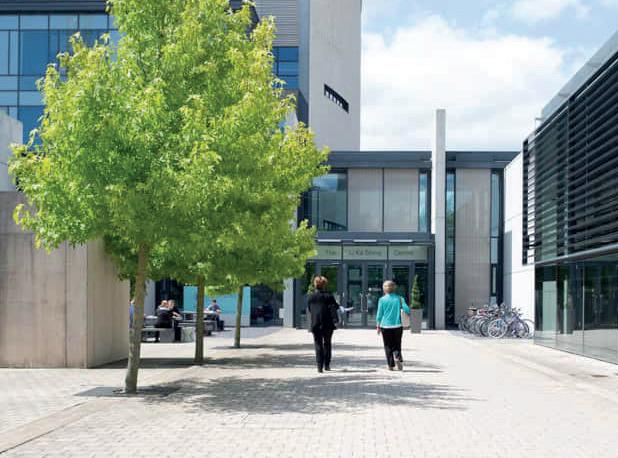
£3 bn
Annual contribution to the UK economy
THE CLUSTER IN NUMBERS
Including more than 400 companies
+200%
Growth rate over the past five years
Over the past century, 50 Nobel Prize winners have been associated with Cambridge
21
A STRA ZENECA WRITING MEDICAL HISTORY IN CAMBRIDGE
Thanks to its cutting-edge discoveries and world-renowned research, Anglo-Swedish pharma company AstraZeneca is known all around the globe, not least after its contribution to tackling the COVID pandemic. The Link visited AstraZeneca’s premises at Cambridge Biomedical Campus to learn more about its revolutionising research, collaborations and what makes Cambridge the perfect place for AstraZeneca’s new Discovery Centre.
We are very proud of being an Anglo-Swedish company, with around 30 sites globally. We have four key R&D hubs; two of them are in the US, one is in Gothenburg and then, of course, one here in Cambridge,” says Dr. Douglas Ross-Thriepland, Director of the Joint AstraZeneca-CRUK Functional Genomics Centre.

Headquartered in London, AstraZeneca has premises all over the world. The main R&D centre is located in Cambridge, at the heart of the biomedical campus, giving it access to its world leading ecosystem. “The main R&D centre used to be located in Manchester but was moved shortly after Pascal Soriot took over as CEO in 2012. Pascal had a vision to make AstraZeneca a world leading company and wanted to move the centre closer to other leading stakeholders within life sciences.”
In 2013, AstraZeneca launched a strategy with the aim to return to growth and achieve scientific leadership. This included the relocation of the R&D centre, and when looking for a new location, the biomedical campus in Cambridge seemed like a natural choice.
“When searching for a new location, we looked at Cambridge, and saw that it was a city driven by innovation, which was exactly what the company needed to turn itself around. Whatever metric you look at per capita; Nobel Prizes, R&D, funding, number of companies – you name it – Cambridge was the number one place to be.”
22
“
TEXT: SAGA PALMÉR | PHOTOS: RADEK DRANIKOWSKI/ASTRA ZENECA
Since the R&D centre was established in Cambridge, both the number of employees and collaborations have increased in warp speed. Today, the company has about 3,000 R&D scientists based in Cambridge, and a number of ongoing projects. “We’ve been here for about seven years now, and just in that time, we have carried out over 200 different partnerships with either academia or industry, as well as over 132 PhDs and postdocs with the University of Cambridge. This is key for our ability to innovate in an ever more challenging environment.”

Thanks to the campus’ great number of businesses, organisations, and other stakeholders, it offers significant opportunities for collaborations. Douglas highlights the natural meeting places around the area, such as outdoor spaces and cafés, where researchers, scientists and other specialists can naturally meet, and ideas grow organically. “It’s really important for us to be somewhere where we have that close geographical proximity to organisations that we want to collaborate with. The serendipity of having coffee or going out for drinks together is an essential gateway to collaborations.”
Another important factor making the collaborations not only successful, but even possible, is the involved businesses’ ability to share knowledge, without seeing each other as competitors. Douglas explains that since the companies only use parts of the findings to generate business, they can easily share other parts of the research with each other.
“A key component making the collaborations successful, is that they are value generating for everyone involved. For example, when we run a project, we will only need to keep parts of the findings confidential – such as the parts we build our drug programmes on. Meanwhile, some of the findings, such as technology findings, are not value generating to our business, which means that we are happy to share them with the rest of the academic community here. This helps keeping the ecosystem world leading.”
According to Douglas, the collaborations that AstraZeneca has cultivated, in Cambridge and globally, during the last decade have been crucial when it comes to driving drug development, and to its success. “Today, we see drug discovery as a team game. Collaboration is becoming increasingly critical as diseases are becoming more and more challenging. It requires the best people from multiple disciplines to come together to find solutions.”
The team is now getting ready to open the new Discovery Centre – a £1bn state-of-the-art R&D facility, containing advanced robotics, high-throughput screening, and AI-driven technology. The centre is scheduled to open later this year, and will support the company’s focus on specialised and precision medicines and foster the discovery and development of next generation therapeutics.
23
PREVIOUS EVENTS
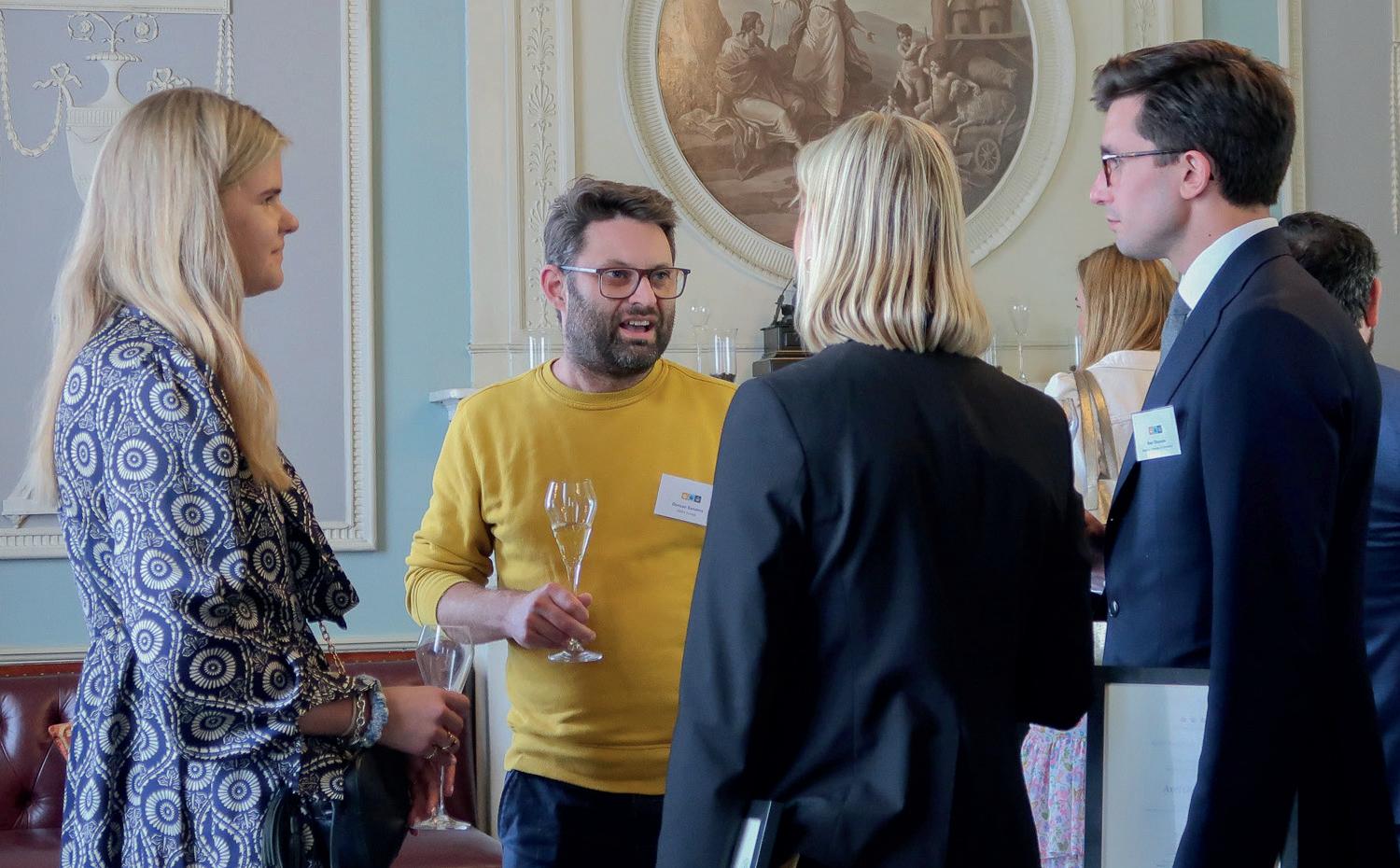

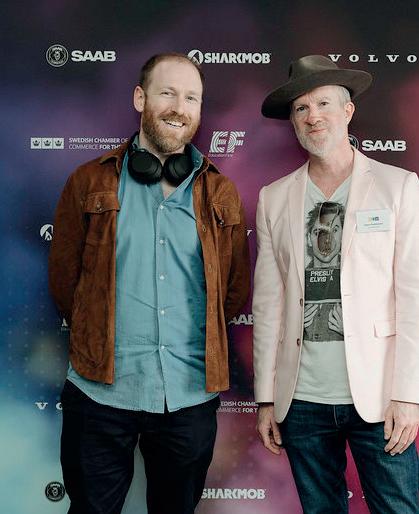


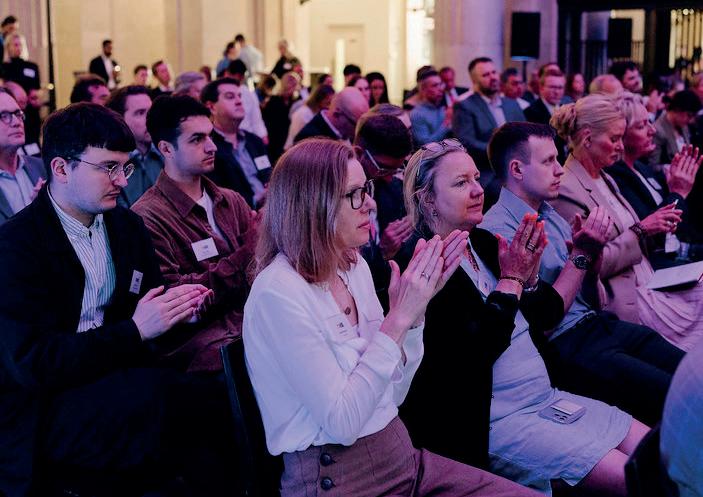


24 May 2023: The Age of AI: Tech Forum 2023 at Banking Hall in London.

8 June 2023: The 116th Annual General Meeting at Home House in London.
From left to right:


1) Ida Hansson Brusewitz, Editor Di Digital, Dagens industri, networking with other guests.

2) Fredrik Warneryd, Chief Executive, SCC with the Master of Ceremonies Hélène Barnekow, Partner, Ascension, and Mats Lewan, Futurist, Research Analyst, Author.

3) Anders Holmquist, Chief Technical Officer & Co-founder, Sharkmob, on how computer intelligence is transforming the gaming industry.
4) Tim Hesse, VP AI & Analytics, EF Education First and Valentino Pacifici, VP, Sana, discussing how AI is reshaping education.
5) Tech Forum gathered a great number of attendees.
6) Akhil Chainwala, Investment Director, Kinnevik and Erik Sprinchorn, Founding Partner, TIN Fonder, about investing in AI.
7) Julie Dawson, Chief Policy and Regulatory Officer, Yoti; Felicity Burch, Executive Director, Centre for Data Ethics and Innovation and Tess Buckley, AI Ethics Senior Analyst, EthicsGrade, discussing ethics and regulations within the AI sphere.

8) Peter Jelkeby, CEO & CSO of IKEA UK & Ireland was elected new Chair of the SCC at its AGM. Pictured together with Jan Olsson, CEO Nordics Deutsche Bank and retiring SCC Chair, and Fredrik Warneryd, SCC Chief Executive.
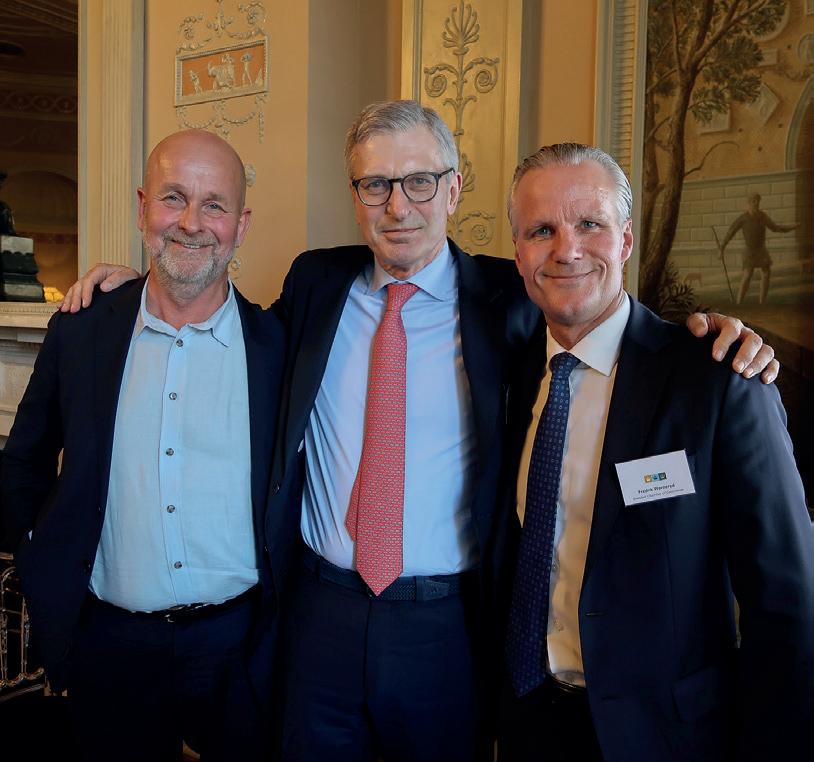
9) Christina Hamilton and Duncan Sanders from ABBA Voyage networking after the Annual General Meeting.

10) Aidan O’Sullivan, Associate Professor in Energy and Artificial Intelligence, UCL Energy Institute, and Co-Founder, Carbon Re and Jesper Andreasson, the Think Tank.
11) Daniel Akenine, National Technology Officer, Microsoft, Theo Blackwell, Chief Digital Officer, Mayor of London’s Office and Catherine Breslin, Founder, Kingfisher Labs about AI’s role to institutions.
12) The Saab team, Nicolas Clark-Majerus, Gabriella Yankowich, Malin Svahn and Jonatan Olofsson.
CRISIS MANAGEMENT ROOTED IN SIMPLICITY

With a growing number of cyberattacks targeting organisations and institutions, it is more important than ever for businesses to prepare for the damage it may cause. By using an online training and management platform, SCC member Murphy Solution trains businesses and employees, to improve their capability to handle these types of attacks. The Link talked to Johanna Williams, Consultant in Crisis Management and Continuity Planning at Murphy Solution, about the importance of having a crisis plan in place if needed.

26
TEXT: ANNABEL DAISLEY | PHOTOS: FREDRIK BENGTSSON & MATTIAS NILSSON
Our vision is to create a global crisis management standard that has its roots in simplicity,” says Johanna when describing the business. Seeing that existing platforms on the market were overly complicated and that there was a need on the market for a user-friendly digital platform when handling a crisis, Murphy Solution set out on its journey to fill the gap.
“The platform is created by people with an extensive background in the field, including counter-terrorism policing, military, and airport operations. All have a vast understanding of how a crisis can affect people and organisations.”

The company offers digital training to raise awareness within organisations on handling different types of crises. “We believe in raising the base standard of knowledge within crisis and security for as many as possible in the organisation and make them feel safer in these events.” Johanna explains that educating across the breadth of the organisation to boost resilience is important, as it can otherwise create vulnerability.
Rapid changing environment
Johanna believes that one of the greater challenges organisations of today are facing, is the rapidly changing environment we live in. “Today’s society is characterised by information overload, which makes it almost impossible to have a good structure for handling all the
information. In a crisis, it is important to have a framework in place to understand how everything works and what the action points are.”
Thinking outside the box
According to Johanna, our “checklist mentality” makes us underestimate human competence. “Your plans are not going to help you to be adaptable. Instead, you must analyse, think outside the box, and make use of the competence already present within the organisation.”
Preparing and preventing
“It’s important to prepare for a crisis, but you may never be able to prevent it from happening,” Johanna says when explaining the importance of having an action plan in place for when a crisis occurs. “You have a lot to gain from preparing for a crisis, in regard to finances, reputation, as well as your employees.”
She emphasises that a crisis often arises unexpectedly, and that the preparation work requires resources to be able to handle it. “I don’t think that you can crisis-proof an organisation, but you can create higher resilience against them by identifying risks that may affect your company.” Johanna says that it is important for an organisation to be realistic and prioritise what precautions to take when handling a crisis. “Instead of doing everything, just make the best out of what you can, simplify what you can and don’t make it too complex.”
“ 27
The team at Murphy Solution, with Johanna Williams second from the left.
PETER JELKEBY: NEW CHAIR OF THE SWEDISH CHAMBER OF COMMERCE FOR THE UK
Peter Jelkeby, CEO & CSO of IKEA UK and Ireland, was appointed Chair of the Swedish Chamber of Commerce for the UK (SCC), at its 116th Annual General Meeting on 8 June 2023. Peter Jelkeby succeeds Jan Olsson, CEO Nordics of Deutsche Bank, who is now retiring from the position after six years in office.

Peter was appointed to the SCC’s Board of Directors in 2021. As Board Member, he has taken an active role and been engaged in its Constitutional Working Group, futureproofing the governance and structure of the organisation. He has also been a frequent supporter of SCC activities and events. Peter’s journey with IKEA began in 1989 and over the years he has held positions throughout the global company, including first joining IKEA UK and Ireland in 2000 taking roles such as Deputy Country Manager. In 2008, Peter joined Clas Ohlson AB and in the eight years with the retailer held the role Executive Vice President and COO, latterly as acting CEO. In 2019, Peter re-joined IKEA UK and Ireland, as CEO and Chief Sustainability Officer.
“We are absolutely delighted with today’s appointment of Peter as Chair of the SCC,” says Adine Grate, Chair of the SCC Nomination Committee, and Member of the Executive Committee. “As he now takes the step from Board Member to Chair, we will be able to further leverage on his vast experience and leadership accomplishments in our strive to continuously increase the value of the Chamber for its members. We are confident that the Chamber, under Peter’s leadership, will continue to go from strength to strength.”
“On behalf of the Board, I would also like to thank Jan for his commitment to the Chamber during his six years in office. Through his chairmanship, he has been leading the Board of Directors and supported the SCC team to evolve the Chamber into the vibrant business platform it is today,” says Adine.
28
The SCC strengthens its Board with four new members at its 116th Annual General Meeting
On 8 June 2023, the Swedish Chamber of Commerce for the United Kingdom (SCC) held its 116th Annual General Meeting (AGM), welcoming four new members to its Board of Directors.

At the meeting, the following candidates were elected to the SCC Board of Directors:
• Lisa Christie, UK Director of Public and Regulatory Affairs, and interim UK Country Manager at Vattenfall
• Henrik Nordvall, Country Manager for H&M UK & Ireland
• Carl Pihlgren, Partner and Regional Tax & Law Leader of Nordics at Ernst & Young
• James Yates, Chief Financial Officer, and Managing Partner at IK Partners
“With today’s appointments we continue to diversify and strengthen the Chamber’s position as the ultimate Swedish-British business platform,” says Adine Grate, Chair of the SCC Nomination Committee and Member of the Executive Committee. “The elected Board Members are all seasoned business professionals bringing extensive experience from their sectors and industries, reinforcing the Chamber’s position further.”
The AGM saw Alex Marsh (Klarna) and Niko Ek (SAS) retire as members of the Board, alongside Björn Savén (IK Partners) who has served as Board Member for 12 years, and Jan Olsson (Deutsche Bank), who joined the Board in 2008 and now steps down from his position as Chair after six years in office.
SCC Annual Report 2022
Scan the QR code to see all the highlights from last year in the Chambers Annual Report.
The SCC welcomes a new cohort of young talents to its scholarship programme
At its AGM, the Swedish Chamber of Commerce for the UK welcomed a new cohort of five young talents to join its 12 months scholarship programme. The programme offers them a unique opportunity to join the Chamber secretariat for a full year experiencing the world-leading financial centre and Europe’s business capital, London.
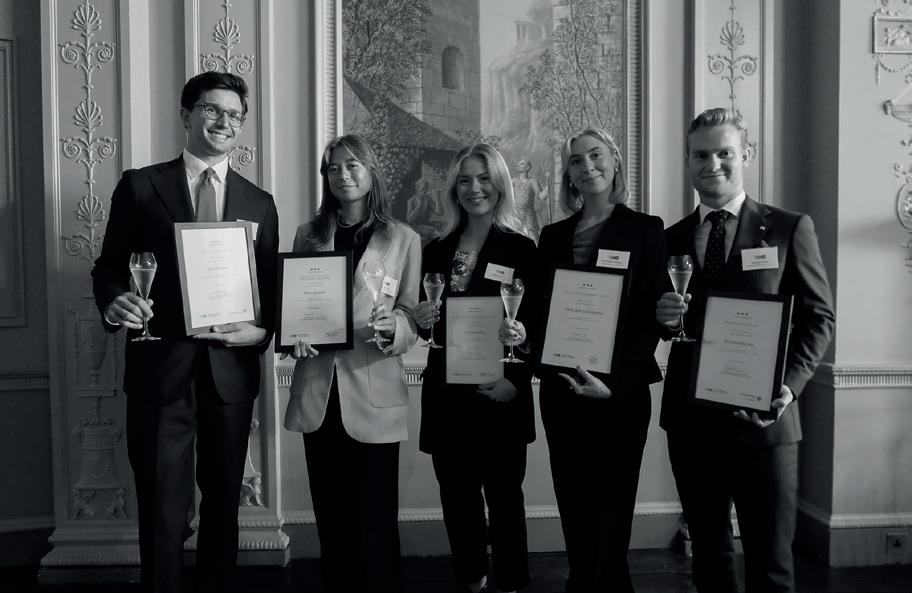
The programme is made possible through generous grants and donations from our scholarship partners, enabling young talents to gain invaluable international business experience as part of the SCC team. This year’s recipients are:
Elof Hansson Foundation
Recipient: Axel Olausson
Sten A. Olsson Foundation for Research and Culture
Recipient: Ebba Nyström
Scholarship Fund for Swedish Youth Abroad
Recipient: Maja Stenberg
Gull & Stellan Ljungberg’s Foundation Scholarship
Recipient: Molly Bohlin Hedström
Sparbanksstiftelsen Finn
Recipient: Timoteo Harvey
“The scholarship programme is a truly unique platform for young talents to grow and develop professionally and as individuals. Today, many of its alumni are business leaders at large multinational corporates, senior marketing directors or founders and entrepreneurs,” says Fredrik Warneryd, Chief Executive of the Swedish Chamber of Commerce for the UK. “The large amount of highly qualified applications we receive is confirming the value of the programme, both to our scholars and to the development of the SCC.”
29
During
JAN OLSSON CHANGING CHAIR
There have been quite a few changes taking place these years – some expected, some very unexpected,” Jan says. “During my time as Chair, the Chamber has had three CEOs, and the UK has had four different Prime Ministers, two ruling Monarchs, Brexit and a pandemic at its hands.”
When Jan took over the Chairmanship, the UK had just voted to leave the EU, but knew nothing about COVID-19, nor the upcoming war in Europe. In the years that followed, the country has had to counter one crisis after the other, forcing both the Chamber and many of its member businesses to do the same.
“The pandemic was especially worrying, as it didn’t just affect the Chamber and our events, but basically all our members were struck in one way or another. But we did all we could to steer the community through the storm, and I think we came out on the other side in a much better condition than we had expected.”
Similarly, Jan believes that the outcome of Brexit has been better than many first thought.
“Brexit was a big milestone. At first, the worry was huge –we were in so many crisis meetings and the circumstances seemed impossible. But we worked together, we managed and today our situation is actually better than before Brexit. My learning is that if you have great stakeholders –great employees, members, and leaders – you will always find solutions.”
Entering the community
Jan first encountered the Swedish Chamber of Commerce through his role as CEO Nordics at Deutsche Bank. As an active member of the international business community, he felt it only natural to get involved in the Swedish Chamber network.
“The various Swedish Chambers of Commerce provide an extremely important network internationally, especially here in the UK. By the time I decided to become a member, I had already encountered the Swedish Chambers abroad several times, and seen the value they bring to Swedish businesses.”
A few years later, he joined the SCC’s Board of Directors, and was then elected Chairman in 2017, succeeding Béatrice Engström-Bondy. He believes that his vision for the Chamber, along with his position at Deustche Bank, made him a good fit for the role.
“I really wanted to become Chairman – I had high ambitions for the Chamber and saw a lot of opportunities when it came to growing the membership. Apart from that, I believe my background in an organisation like Deutsche Bank meant that I could add a lot to the community.”
Over the years, not only has the membership grown, but the events and service offering changed significantly. Some events, such as the Spring Ball and Crayfish Party, have left the agenda, making room for new finance focused events, such as the Nordic Private Equity Forum
30
TEXT: SAGA PALMÉR | PHOTOS: BEN FISHER, FILIP PALMBÄCK, RADEK DRANIKOWSKI
“
his six years as Chair of the Swedish Chamber of Commerce, Jan Olsson has navigated the community through Brexit, COVID-19 and now the rising inflation. Now, as the Chairmanship is about to come to an end, the Link sat down with him to speak about his highlights, insights and what’s next in store.


31
IT TAKES COURAGE TO TAKE ON A CHALLENGE
EVEN WHEN IT COMES FOR FREE
Together with The Carl Silfvén Scholarship Foundation, Stockholm School of Economics is proud to present a scholarship, giving you the opportunity to earn an Executive MBA in Stockholm, Sweden. Covering the entire tuition and additional expenses. All you need is courage.

Read more and apply at www.hhs.se/scholarship
Deadline August 15
and the Nordic M&A Forum. On the service side, Jan mentions the expansion of the business services department as especially important.
A new Chamber chapter
On 8 June, at the SCC’s Annual General Meeting, Jan passed on the torch to Peter Jelkeby, CEO & CSO of IKEA UK and Ireland, who will take over the role as Chairman. Jan believes Peter, coming from a different background than himself, will bring a new, valuable perspective to the organisation.
“Although I will miss being Chairman, I believe the time is right for this transition. Peter has lengthy experience from the retail sector, and is good at looking beyond London, which will be a great contribution to the Chamber.”
In the upcoming years, Jan hopes that the community will continue to grow outside of the capital region. “I would like to see the Chamber spread wider across the UK. I feel that there’s a demand from regions far beyond London, and the Greater London area. This work has already begun with our Swedish Footprint project, and I hope it will expand even more. “
When it comes to his own future, Jan is not planning to slow down. Apart from his role as CEO Nordics at Deutsche Bank, he is involved in several other boards, where he will continue his work.
“I’m also Chairman of the International Bank and Finance Association, and on the board of the Swedish Bankers Association in Stockholm. Then I have a few other projects in the pipeline, so I doubt that I will get bored.”
More importantly, Jan will make sure not to miss out on the SCC events, which he will be able to enjoy with a more leaned back approach as he steps down as Chair. He wants to make sure to keep the bonds strong with both members and businesses, and says these have been the highlights of the Chairmanship.
“For me personally, the best thing has been the people I’ve met during my years at the Chamber. I’ve met some incredible individuals, with bright ideas and great fighting spirit, both internally in the organisation, and when meeting our member businesses.”
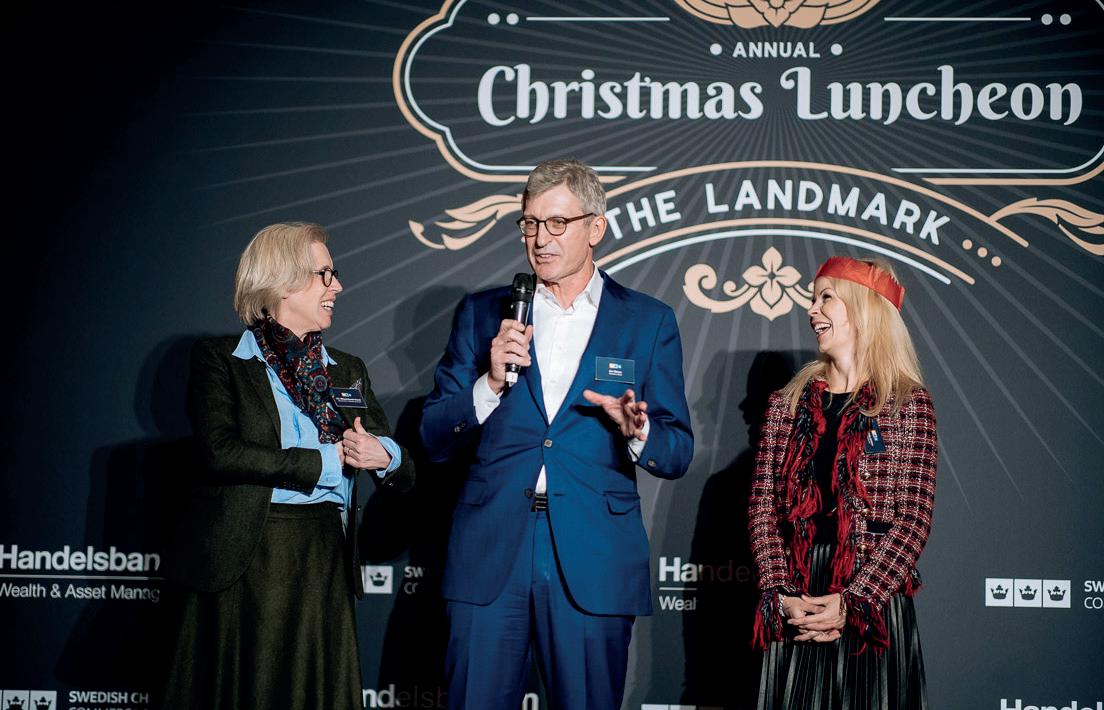
33
PREVIOUS EVENTS
Over the year, the SCC hosts a wide range of different events such as Business Breakfasts, Rountable Discussions and Business Insights for our Young Professionals community. Here are some of the events hosted in the previous months.
From left to right:
1) Sebastian Cameron (Just Climate), Tanja Gihr (Barclays), Salvatore Santoro (DNB Markets) and Carl Leijonhufvud (Headland Consultancy) discussing ESG and the way forward at Nordic M&A Forum 2023 hosted by Linklaters.
2) Michaela Berglund (Feminvest) discussing the importance of female ownership at a Young Professionals Evening Talk.
3) Fredrik Bolander (Lincoln International), Nuala Higgins (Carnegie Investmant Bank), Pia Kåll (CapMan Buyout), Jan Olsson (Deutsche Bank), Tobias Åkermark (Barclays) and Anna Skoglund (Goldman Sachs) at Nordic M&A Forum 2023.
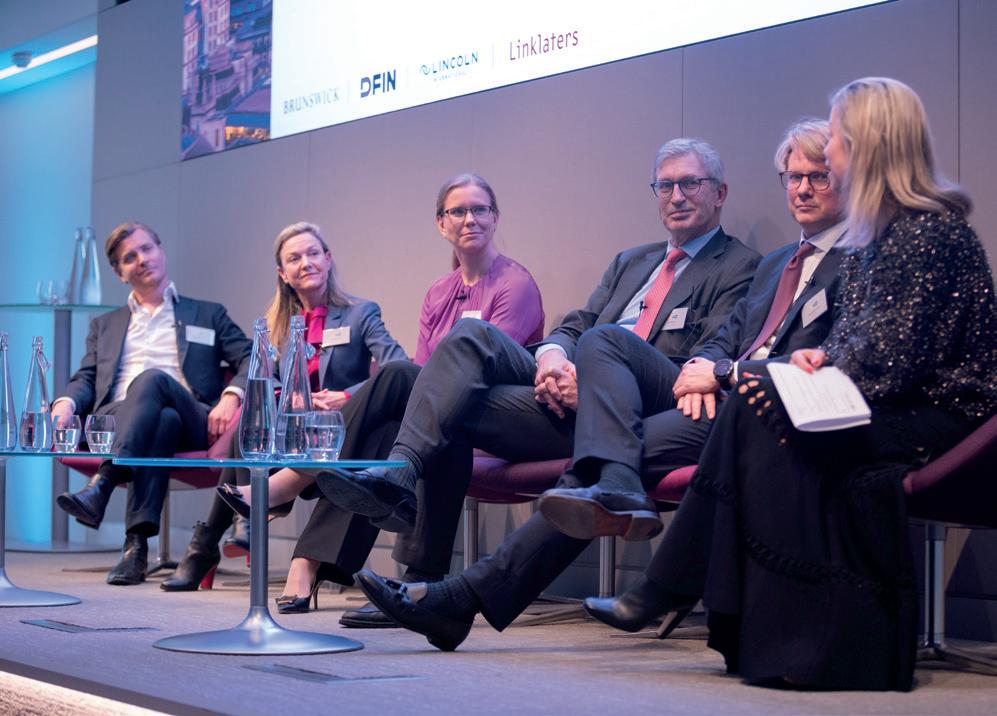
4) Kirti Lickfett (SCC) and Qahir Bangali (Business Sweden) at the Young Professionals: Masterclass with LinkedIn.
5) Daniel Stillit (Adjunct Value Partners) at Nordic M&A forum 2023.
6) Stephanie Zakrisson (Swedish Broadcasting in the UK/SR) and Saga Palmér (SCC) at a Young Professionals Evening Talk.
7) Jan Olsson (Deutsche Bank), Fredrik Warneryd (SCC), Ivan Levingston (Financial Times) and Magnus Bisgaard (Deutsche Bank).

8) The Young Professionals community listening to a Business Insight with SSAB on their revolutionary work to create the world’s first Fossil Free Steel.

9) Markus Frånlund (LinkedIn) welcoming the Young Professionals to a Masterclass on personal branding on LinkedIn.
10) Ola Nordquist (Permira), Ina Lunneryd (Linklaters), Michael Wand (Carlyle) and Ivan Levingston (Financial Times) speaking at Nordic M&A Forum 2023.
11) Ethan Rudd (SSAB), Tasmin Evans (SSAB) and David Williams (SSAB) at the Young Professionals Business Insight.

12) Networking at Nordic M&A Forum 2023.

13) Andreas Tysk (SCC), Axel Paulsson (SCC), Hannah Carlsson (SCC), Annabel Daisley (SCC) and Erica Wäreborn (SCC) at the Young Professionals Masterclass with LinkedIn.
14) Nicolas Moura (PitchBook) presenting the first keynote on the state of Nordic M&A at the Nordic M&A Fourm 2023.

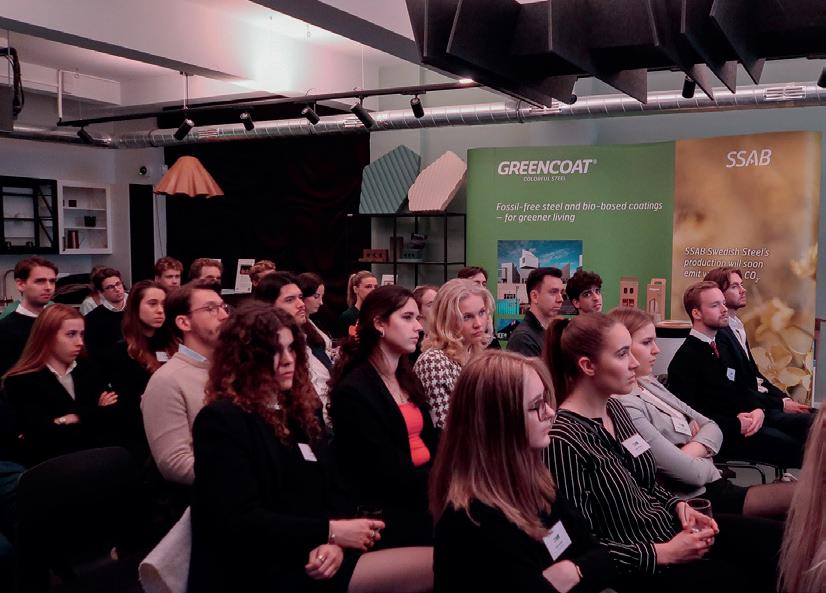

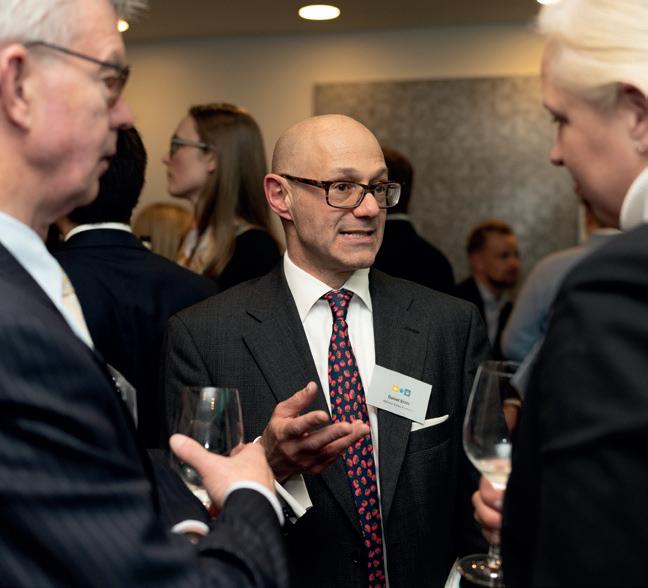
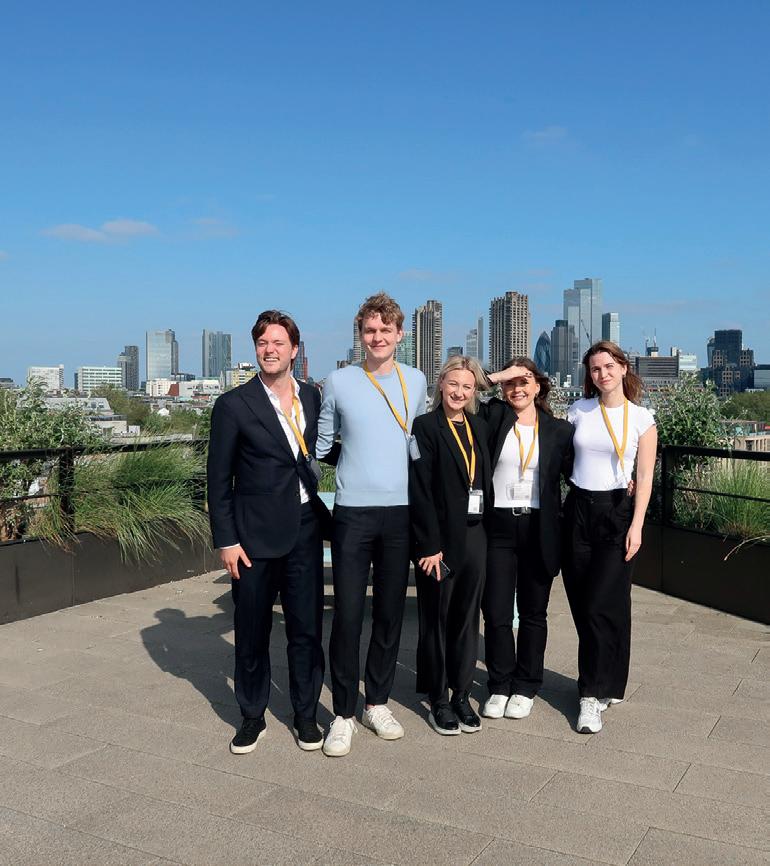





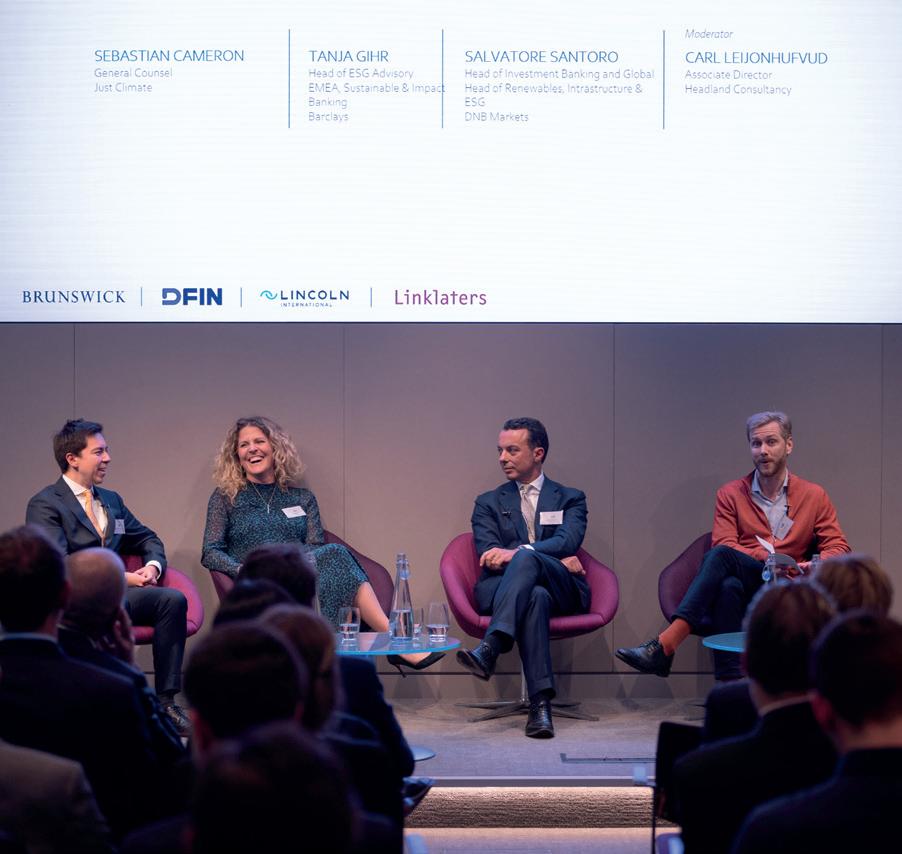

REVOLUTIONISING LEGAL PROCESSES
The legal industry is one of the oldest professions operating today, but how can it leverage technology to improve productivity? The Link spoke with Kira Unger, CEO and Co-founder of SCC member company PocketLaw about how companies can optimise their workflow, through what they call “Lean Legal”. “I firmly believe it is crucial to pay attention to your legal processes in order to be able to improve and remove anything that might be blocking your ability to grow.”
PocketLaw has since its establishment back in 2018, continued its international expansion at a rapid pace to facilitate businesses’ legal processes. “We believe that having control of your legals, frees up resources, and can unlock all your business’ potential,” says Kira. She explains that legal touches on most aspects of the business, from engagement of customers, suppliers, and staff, to dealing with company admin and compliance.
Revolutionising legal processes
To help businesses get on top of their legal processes, PocketLaw recently introduced its new framework, “Lean Legal”, that is set to revolutionise how businesses approach their day-to-day legal challenges. “Lean Legal aims to encourage a more strategic and data-driven way of optimising legal processes and to grow smarter.”
Necessary measurements
According to Kira, the time has come for legal functions to measure and follow-up on their performance, the same way any other business department would. “Sales have targets and KPIs, and so do marketing, customer success, and product – so why don’t we have similar targets when it comes to legal?”
Without measurements like these, organisations risk failing to understand and identify which areas they need to improve. “By breaking down challenges and establishing clear expectations, including acceptable risk appetite, transparency and improvements will be inevitable.” This
will, according to Kira, allow businesses to gain control while scaling, and thereby advancing growth.
Legal – a facilitator of business and growth
“Legal is often seen as the bottleneck or ‘red tape’ of the company, instead of the facilitator of business and growth.” Kira believes it is crucial to pay close attention to a company’s legal process, to be able to improve it. “With our legal management platform, you are able to streamline legal processes to drive efficiency, reduce costs, and achieve better outcomes faster.”
Through Lean Legal’s data-driven approach, businesses can extract insights and use them to develop strategies going forward. “The cycle promotes the use of data obtained from legal, just like any other department, to align and support business goals as well as the long-term vision of the company.”
Legal thresholds when entering the UK market
When Swedish businesses expand to the UK, they are entering a different legal landscape, but according to Kira, the legal thresholds aren’t overwhelmingly many. “The legal content looks different in the UK, but you will have the same challenges as in Sweden when growing your business.”
This includes keeping control of legal documents, implementing an appropriate standard in terms of employment contracts, GDPR and compliance as well as
36
TEXT: ANNABEL DAISLEY | PHOTO: POCKETLAW
corporate matters. “Even if the legal content needs to be adapted to local regulations, the overall workflows are the same and companies can benefit from implementing scalable and uniformed processes.”
Growing in the UK
Since its UK launch in 2021, PocketLaw has grown its team to 15 full-time employees, with plans to expand
even further. Today, 25% of its customers are based in the UK, and Kira is looking forward to continuing the expansion journey. Pocketlaw has once again proven that the platform is well-suited to businesses in every market with its successful launch in Germany in March 2023. “Our ambition is to keep expanding and become a global company that helps organisations across the world to work smarter and better with legal.”
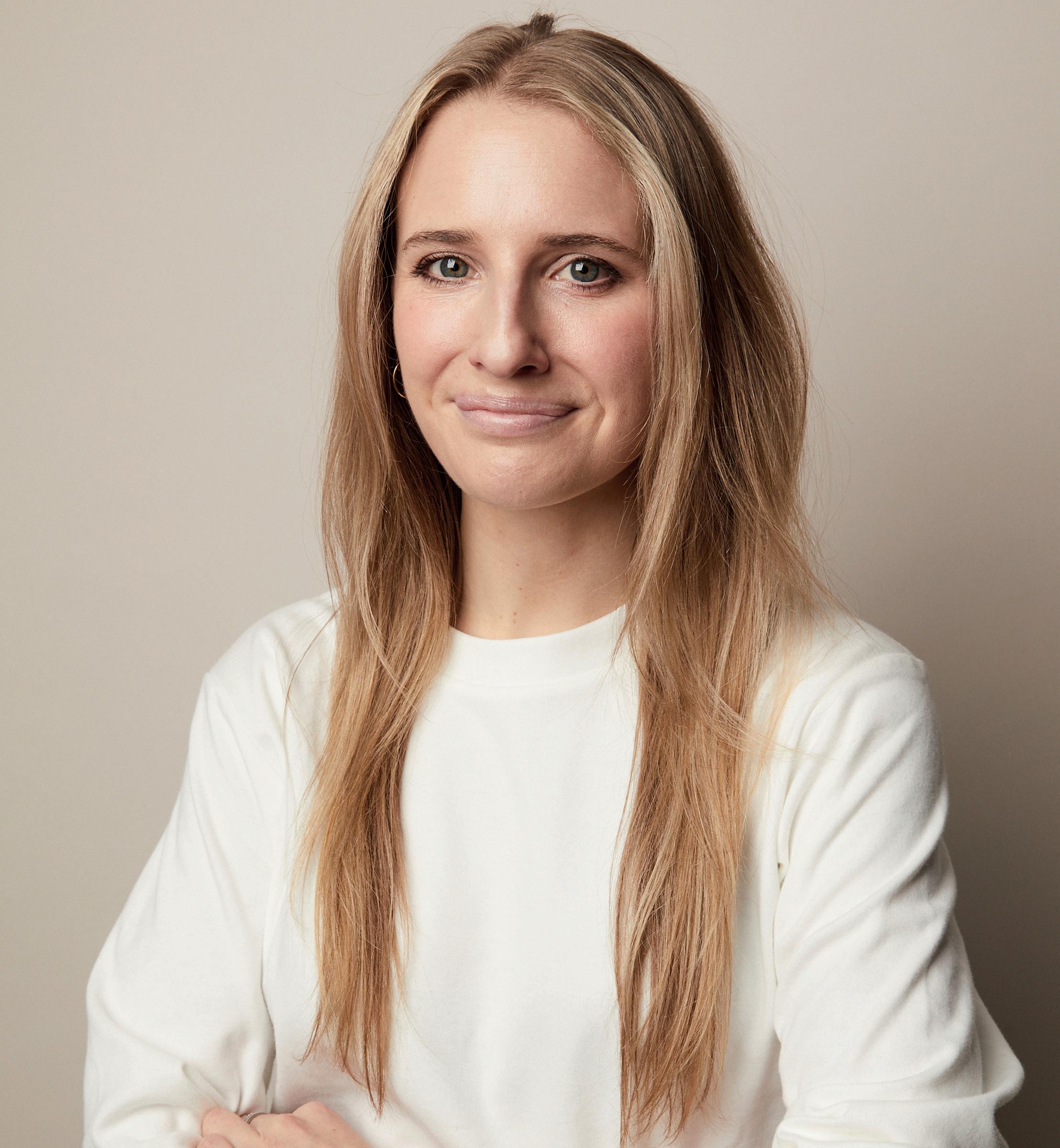
37
“
Legal is often seen as the bottleneck or ‘red tape’ of the company, instead of the facilitator of business and growth.
SPOTTING TALENT: WHAT DOES ONE LOOK FOR?
In England alone there are more than 40,000 registered football clubs, and one can find ties to the sport in some form all across the UK. “Football is the world’s most popular sport, and most people can relate to it as every country has its own national team, which ultimately unites people,” says Aswar Ubah Kadie, founder of Aswar Sports Agency. But how does one spot talent and in what way can sports unite people around the globe?
Established on the UK market in 2021, the people behind Aswar Sports Agency consists of a small team. At the moment, Aswar is the only FIFA licensed agent in the company and prior to expanding the business to the UK, she has worked in the sports industry and has been present in Scandinavia for several years. “Our dream and goal has always been to become Europe’s leading agency, so a good way to start was to expand to the UK as it is the birthplace of modern football.”
Before becoming a sports agent, Aswar was amid pursuing a bachelor’s degree. “Having studied law before has been a good asset for me as we handle a lot of contracts and negotiate different types of deals for our players.” Given that the company represents players both on and off the pitch, it helps clients in several aspects. “Our clients are a combination of retired players and people that actively play today, so it can range from us arranging brand deals to taking care of them.”
United through sports
For decades football has symbolised a way of uniting people and created communities around the sport. “Most people can relate to it as every country has their own national team, which unites people from all parts of society.” Aswar believes that another contributing reason, in the UK especially, rests on the history the sport beholds. “Most Brits have their teams, which many times is passed on from their parents, and can travel through generations.”
What to look for
When looking for potential players, Aswar describes that there are a few things she pays extra attention to. “For me, it’s not only about the talent. It’s about finding someone who has a strong mentality, who is committed to working hard and has a lot of discipline.” She continues to explain that it is important to look at who the person surrounds themselves with as they have an influence on the person.
Adding to this, Aswar describes a few personality traits that the person must have. “The three main things are being humble, disciplined, and genuine.” Continuing, Aswar is clear about the fact that scouting and recruiting talent takes time. “Our scout and I go to see different games all the time, and we analyse everything. At the same time, we try to follow the development of a player as you never know where they might be in one or two years.”
Talent spotting across industries
Upon the question whether it is possible to apply these talent spotting strategies in other industries, Aswar believes it is. “Regardless of which industry you are in, we try to find talented and motivated people to join the team, which is solely based on that person’s characteristics.” She adds: “Ultimately, what you are looking for is someone that is passionate about what they do and is committed to working hard.”
38
TEXT AND PHOTO: ANNABEL DAISLEY

NEW MEMBERS
Founded by businesses for businesses, the Swedish Chamber of Commerce for the United Kingdom is the ultimate business platform connecting Swedish and British companies and entrepreneurs across the North Sea.
We are a not for profit organisation, and help businesses establish, grow and develop. Our focus is on providing relevant and informative forums and meeting places, on forging new and exciting networks and eco-systems, offering valuable training programmes for personal and professional development and to deliver first-class business services tailored to your business needs.
We bring value to member businesses across all sectors and industries, from large corporates to SMEs, entrepreneurs and start-ups, in the United Kingdom as well as in Sweden.
WOULD YOU LIKE TO LEARN MORE ABOUT THE MEMBERSHIP? CONTACT: CHRISTOFFER.WALDEMARSSON@SCC.ORG.UK
ABBA VOYAGE

ABBA Voyage is the long-awaited concert from one of the biggest pop acts of all time. Blending cutting-edge technology, spectacular lighting, and some of the most beloved songs ever written, ABBA take to the stage in a whole new way. In a stunning, purpose-built arena, one of the most popular groups in history appear as digital avatars in the first live show of its kind.
DANIA SCANDINAVIAN SCHOOL
Dania Scandinavian School is a welcoming environment for all children between the ages of 2 and 8 to become confident learners. Formerly Dania School, the school was founded in 2013 on Scandinavian ethos that supports a child’s personal development through inquiry-based lessons and plenty of time spent outdoors.
40
EIP EUROPE LLP

EIP is a leading IP law firm advising on high-value and complex patent matters. Its multidisciplinary team combines patent attorneys, litigators and commercial IP lawyers, and operates in three of the world’s main patent markets - Germany, UK and USA, as well as in the Nordics through its recent expansion into Sweden.
HEADLAND
Headland is a strategic communication consultancy that helps businesses shed light on important insights and perspectives that can affect them. Through its method and collaboration amongst experts, its actions provide the impetus for powerful communications and raises reputations that put Headland’s clients in control for the future.
KHRAFT
Khraft helps support growth, as well as increases value for individuals, businesses, and society through coaching, training and leadership support. The company inspires learning within organisations, and empowers leaders to lead from within, through its different programmes in order to navigate and develop coaching and drive change.
LEPAYA
Lepaya is an L&D Technology and Power Skill training provider that connects people’s potential to business impact. As a part of the learners flow, Lapaya offers learning content, methodology, and technology on one platform. With a blend of online, offline, VR and AI-powered training, it trains talent with the right skills at the right time, in the right way to make the most out of professional and personal lives.
MEDIAFLOW
Mediaflow is an easy-to-use, cloud-based GDPR-compliant platform for images, video and brand management. The platform makes it easy to collaborate, share and organise files easily and efficiently for people working within communication, marketing and other creative industries.

PADIUM
Padium is the UK’s newest premium padel operator, and will open its flagship club in Canary Wharf in June 2023, featuring seven indoor courts and state-of-the-art facilities. Its vision is to elevate the game to a new standard in the UK, as well as strive to deliver a world-class experience before, during, and after a match.
41
WHAT IS “THE RIGHT KIND OF LOUD”?

Most business professionals would agree that the art of communication is one of the most valuable resources today. As competition for attention keeps growing, so does the need to adjust to the audience we are trying to reach. Kim A. Page, Author and Communication Expert, taught the Link how to be not only loud, but the right kind of loud.
There’s a famous quote by a business coach called John Baldoni, saying ‘The words a leader speaks are important, of course, but how they are delivered can make all the difference, especially in tough times.’ This sums it up quite well,” Kim says and explains: “I can’t think of any job where communication doesn’t matter. It is key to making your customers want to buy from you, your employees trust you or your audience want to listen to you.”
Kim developed a method called “the Right Kind of Loud” – described as a toolbox of voice, body language, listening and speaking skills, helping clients create a powerful and efficient communication style. Being a good communicator, she explains, is just as much about understanding yourself, the speaker, as it is about understanding the receiver.
“Communication has so many layers – it’s about reading the room, making yourself stand out and being trustworthy so you can connect with your audience. Sometimes this means deciphering hidden messages or understanding the true meaning behind a question.”
Art and communication
Kim started her career as an artist, singing, writing and performing. A few years down the road, she started giving classes and organising workshops, to teach her skills to others. This was the first step towards her future in communication.
“In my twenties, I focused on expressing myself and then people started asking me to teach them the voice technique I was using when I sang, or different writing tools. I had already given a few workshops and voice sessions, and so, organically, I became a trainer in creative subjects.”
The more she was teaching, the more she fell in love with the training role. “I would say that the core of communication is our birth right to access our voice, our body, and our words. I see myself as the doorway for them to walk through. Witnessing my participants get the means and tools to express themselves is so much bigger than being able to express myself. It is very humbling.”
She started out teaching youth and as her experience grew, so did her clientele. Today, she is supporting busi-
42
“
TEXT: SAGA PALMÉR | PHOTO: KATE KUZMINOVA
ness leaders and organisations in multiple fields, including tech, law and finance.
Communication across cultures
Over the years, Kim has been living in various countries and cities, including Copenhagen, Dubai, San Francisco and Stockholm. As a communication specialist, She has gained insights into cultural communication differences and how they impact us.

“Each country, each culture, has quite a few things specific to them. In the context of business, the classic example is the flat hierarchy in Sweden, and the so called ‘consensus culture’, where you strive to have everyone agree before making a decision,” she says and continues: “In the UK, on the other hand, many workplaces have a clear hierarchy and more firm decision-making.”
Communication is not only influenced by where we live, but also by the time we are living in. Kim explains how both the pandemic, social media and the increasing amount of information available to us have affected our attention spans.
“The capacity to listen has been super challenged during the last years, and globally, the attention span has gone down. We live in an attention economy, which puts very high demands on someone trying to deliver a message.”
However difficult, there are ways to improve your chances. According to Kim, preparation is key if you want to beat the odds, and she recommends following some basic steps in a certain order.
“Start by asking yourself a few simple questions – like who is the audience? Why am I doing this, what kind of influence am I aiming at? If you can answer these questions, you’ve already come a long way.”

According to Kim, audience awareness is key. Who are they? What do they like? What is their conception of you? This information can make the difference between a powerful and a bland message.
“As a default, we operate in the world as we see it through our personal goggles. To be a better communicator, you need to step outside of yourself and focus on the people you are speaking to. Being aware that the way you experience the world might be very different from how other people experience it, is a step in the right direction.”
When it comes down to it, Kim believes a good communicator equals a flexible communicator. As every listener, every receiver, is different from the next one, a preparation process that allows you to tailor your message and engage with your audience is the best plan. By having various, multi-use tools in your communication toolbox, you can be sure to have a strategy suitable for every occasion.
43
To be a better communicator, you need to step outside of yourself and focus on the people you are speaking to.
“
WHAT DOES THE CURRENT POLITICAL OUTLOOK MEAN FOR FOREIGN INVESTORS TO THE UK?
GUEST COLUMN: CELIA STEWART, SENIOR CONSULTANT, RUD PEDERSEN PUBLIC AFFAIRS

To say that British politics has been turbulent in recent years is a risible understatement. First, we had Brexit, which still sends shockwaves through the political system and the economy. Then, a global pandemic, branded by critics as “one of the worst public health failures in UK history” due to the Government’s allegedly slow early response and belief in “herd immunity”. Now, as we ride out the aftershocks of both, the ruling Conservative Party is desperately trying to reclaim stability and rebuild trust in the wake of its rudderless final quarter of 2022. At Rud Pedersen, the public affairs consulting firm I work at, our international clients increasingly lean on us to help them unpick policy priorities and make sense of the UK’s political direction as the country attempts to find its feet again.
Britain has traditionally attracted foreign investors thanks to its strong legal system, stable governance and thriving financial and professional services. These recent turbulent times, with three Prime Ministers and four Chancellors in the last year, however, make it harder for businesses to navigate UK politics and get their issues onto the volatile political agenda.
But it’s not all doom and gloom. Although the current lagging economy and worries about growth are causing some investors to tighten their purse strings, the recent Spring Budget in the UK was hailed as the “budget for growth” and it has been said that Britain is on the right track to grow the economy and restore confidence to the markets. The Chancellor’s pledge to remove the obstacles that stopped businesses investing, such as tackling labour shortages by ending reliance on migration to fill vacancies, incentivising Britons into jobs, and harnessing the “British ingenuity that makes the country a science and technology superpower”, will be welcomed by international and tech businesses investing in the UK.
Prime Minister Rishi Sunak also seems to be increasingly instilling confidence and repairing the fractured Tory
party as he continues to weather the storm he inherited from the disastrous terms of Boris Johnson and Liz Truss. The latest polls (ahead of a likely national election in the autumn of 2024) have narrowed and there are early signs of progress on the Prime Minister’s policy priorities, for example, halving inflation this year (the Office for Budget Responsibility has forecasted that inflation will fall to 2.9% by the end of 2023).
There are still several issues that threaten to throw Sunak off course. The ongoing National Health Service strikes, with more on the way from civil servants, junior doctors, and teachers, will make it harder for Sunak to pitch himself as a problem solver against the ongoing backdrop of mass disruption, even if public support for striking
44
workers diminishes. The anticipated High Court verdict on the legality of the Government’s scheme to remove illegal migrants to Rwanda will be a key moment, too.

The first big test for Sunak, though, is the local elections in England and Northern Ireland. If Sunak fails to maintain momentum against the Opposition Labour leader, Sir Keir Starmer, ahead of the elections, it won’t take long for pessimism to return to the Tories and for in-fighting in the party to dominate the agenda once again. At the time of writing, we have not seen the outcome, but while the Conservatives braced themselves for a challenging set of results on 5 May, they were surely crossing their fingers that the coronation of King Charles III the following day would swiftly bury any negative publicity.



























It’s the outcome of the local elections and the economy over the following months that will show whether Britain really is out of the woods yet and whether Sunak can stay in control.






















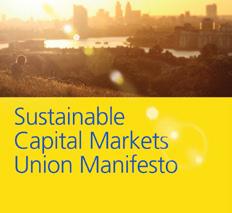























































































































































of both individual countries and the EU. Put simply, we advise clients on what they should say, and to whom, to further enhance or protect their business interests and reputations. The ongoing uncertainty in UK politics allows us to continue to provide valuable advice to our clients, whether they have been operating here for 50 years or whether they are just beginning their own relationship with the UK and looking to invest here.
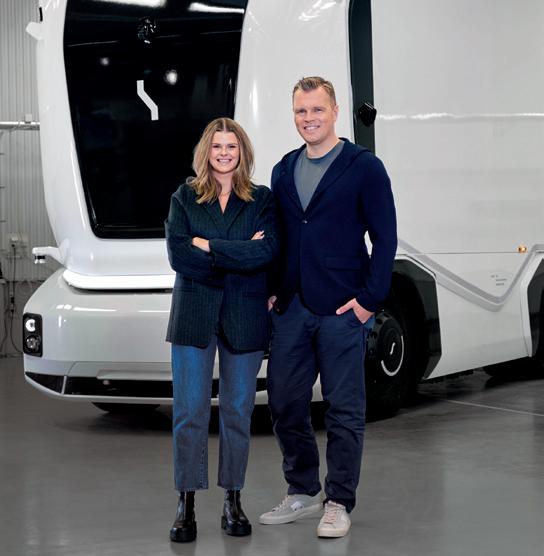
































ABOUT CELIA STEWART

































Celia is a Senior Consultant at Rud Pedersen's London office, counselling clients primarily on the UK media and the inner workings of Whitehall. Celia has experience of working both within the UK media and the Government. She started her career as a journalist, having qualified with a Masters from the prestigious City University, London. She went on to write for publications including the Times, the Telegraph and the Guardian. Her most recent role was working in Whitehall

» The SCC use Rival for printing services –in fact you’re looking at our printing NOW! Print in Good company! OR DIGITAL MARKETING -TECHLONDO .CO Debatable Issue 14 November 2013 Souvenir Edition “Democracy is such a beautiful thing –want a piece of that” (Georgina Hands, MYP for Lincolnshire Central) IF YOU CAN PRINT ON IT...WE CAN PRINT IT! www.rivalcolour.com the industry from the ground up, by integrating an entirely new approach to all aspects of how goods move. Einride Founders Robert Falck, CEO, and Linnéa Kornhed Falck, CMO and Deputy CEO, are taking on the UK with Einride’s ecosystem of digital, electric and autonomous shipping technologies. Dedicated to the Swedish-British business community since 1906. 365 LINK We are looking at re-architecting “
HIGH DEMAND ON EXPLORING THE SWEDISH LIFESTYLE
As the largest country in the Nordic region, Sweden has something to offer every type of traveller, from vibrant cities to its enchanting nature and wildlife. “When we ask Brits to rank what they look for in a trip to Sweden, we see things like ‘experiencing the lifestyle during the summer months’ and ‘focusing on outdoor experiences’ at the top of the list,” says Gabriel Dorch, Senior Travel Trade Manager UK & US, and Country Manager in the UK at SCC member Visit Sweden.
 TEXT: ANNABEL DAISLEY | PHOTO: HENRIK TRYGG
TEXT: ANNABEL DAISLEY | PHOTO: HENRIK TRYGG
Visit Sweden has the official national assignment to promote the country as a tourist destination. This by ensuring the visibility of the country and by trying to reach audiences that consider Sweden as a potential holiday destination. “Many have a fascination with Sweden as it is seen as a safe, secure, and hospitable destination while also being easily accessible,” Gabriel explains.
Bouncing back
During the pandemic, the tourism and hospitality industry was struck severely as it affected people’s ability to travel. However, according to Visit Sweden’s statistics, the industry has started to bounce back. “In our last review, the number of bed-nights was above the 2019 levels, and they are expected to increase further in 2023 and onwards.” Gabriel says that the outlook for both foreign and Swedish domestic tourism is positive, and that bed-nights will, on average, increase by three percent each year from 2019 until 2032.
Maximising time
According to Gabriel, trips aiming to stimulate our senses are growing in popularity. “Many chose activities that increases wellbeing, both physically and mentally, such as experiences in nature. Another trend we see among travellers is a desire to maximise time.”
When it comes to travelling post the pandemic, Gabriel has observed a few patterns. “One is the desire for ‘safe travel’, which might be a response to the uncertainty in the world. Another important trend is ‘catching up’ – the desire to spend time with loved ones.” Gabriel says that the latter has been particularly emphasised in the last two years, as people have had restricted possibilities during the pandemic.
The curious traveller
According to Gabriel, the Swedish lifestyle is thought of as being progressive and modern, which might be why many have a fascination with it. Looking at the typical visitor, Visit Sweden has identified a key audience. “They are curious travellers who want to explore, try new things, as well as learn more about other cultures. They are active and deep diving; they want to do more than just scratch the surface.”
Gabriel believes that most Brits see a trip to Sweden as a form of city break, but would gladly include natural phenomenon such as the northern lights or the midnight sun, and spending time outdoors. “We know that British holidaymakers want to experience a lot during their trips and are happy to combine their city trips with experiences outside the city centres.” For travellers seeking to make the most out of their holiday trip, choosing Sweden as destination should indeed be a no-brainer.
Moreover, Gabriel emphasises the need of creating longlasting value through travelling. “In Sweden, we believe in exploring tourism of tomorrow as well as starting a new era where we get to embrace the world from new perspectives.”

47
Many have a fascination with Sweden as it is seen as a safe, secure, and hospitable destination while also being easily accessible.
“
LEADING IN OUTDOOR EXPERIENCES
With miles and miles of untouched nature and scenic landscapes, Sweden is a world-leading destination when it comes to delivering outdoor experiences, and Jämtland Härjedalen is a particularly popular region among a lot of nature-loving tourists. The Link spoke to Anne Adsten, Tourism Developer and Jonas Herjeby, Project Leader at Jämtland Härjedalen Tourism about what makes the region so attractive for explorers.
People who travel to Jämtland Härjedalen are typically looking for activities close to nature. During summer, this might be biking, fishing, or hiking in the mountains, by one of our many lakes.” Furthermore, Anne mentions that during the winter season the main focus is alpine and cross-country skiing.
According to Jonas and Anne, most tourists coming to Jämtland Härjedalen are looking for outdoor experiences, although the activities of choice may vary depending on the weather, and the season. “We have what we call the ‘Summer Fun’ offering, and the ‘Winter Fun’ offering. During summer, people are mainly looking to hike along our different routes, and around lake Storsjön – the fifth largest in Sweden.”
In the colder months, Anne explains, tourists prefer activities such as skiing, dogsledding, ice fishing, skating and snowshoeing. “Not all visitors want to be on the slopes for six days straight, instead they like to get the full experience of enjoying the snow as well as getting cosy in a Swedish “stuga” with a cup of cocoa close to the fireplace.”
Gastronomic Centres
Apart from its outdoor activities, Jämtland Härjedalen highlights the region’s cultural offering, focusing especially on gastronomic content. “There are more than 150 artisan food producers in the area, including cheese, jams, charcuterie, and we even have a few microbreweries, gin producers and one making wine from birch sap,” Anne says.
Thanks to the high number of local food producers, the city of Östersund has become a national centre for artisan food production. “Since 2010, Östersund has been approved as a UNESCO City of Gastronomy, which has really put us on the
map.” Anne adds that they want to continue shedding light on the region’s many activities, especially those which are less known to the wider public.
Putting the region on the map
Established in 1995, Jämtland Härjedalen Tourism is a regional cooperative association. The aim of the group, consisting of 25 destinations and municipalities, is to be a platform for developing tourism in the region and highlight the importance of tourism. When elaborating on why, Anne explains that it is essential to showcase what a life in the region looks like to make people consider a move to one of the areas.
“The region is large – the same size as the Netherlands – but very scarcely populated. This makes it a great place for the traveller looking for an experience close to nature without crowds,” Anne says. This very same reason made Jämtland Härjedalen a pandemic-friendly destination, for those who wanted to travel during the restrictions. “When COVID-19 hit Sweden, we were very lucky – as all our activities are based outdoors, they were regarded by the government as safe, which led up to us not really being affected by the pandemic, as guests could still enjoy the fresh air and activities away from crowds.”
According to Jonas, their tourists are mainly coming from Sweden, Norway, Denmark, Germany and the UK, brought together by their interest in outdoor activities and nature. “Looking at pre-pandemic figures, we see that most visitors are coming from other parts of Sweden, and 20% of the hotels’ commercial guest nights were from people coming from abroad.” Jonas adds: “Now, we are excited to see how our region will continue to attract new groups of visitors, having first discovered us during the pandemic.”
48
TEXT: ANNABEL DAISLEY | PHOTO: NICLAS VESTEFJELL
“
Delivering high quality experiences
When taking a leap into what the future holds for Jämtland Härjedalen, Jonas mentions that they want to spread awareness of tourism’s positive aspects. “From what we have seen historically, tourism has a great impact on our communities, such as creating job opportunities, attracting visitors to the region, keeping rural parts of the region thriving as well as creating a sense of pride and connection between the residents.”
Lastly, he mentions the physical benefits of their outdoor experiences. “We can further see that by spending more time outdoors, it is increasing people’s wellbeing and self-esteem, as they breathe fresh air and see the beauty of nature.” With this in mind, Jonas highlights that the ambition is to always deliver high quality experiences for guests from all aspects.

UPCOMING EVENTS
The SCC organises around 90 events each year, ranging from smaller, intimate Business Breakfasts to larger conferences with some 200 participants and speakers from across the Swedish-British community. Visit our event calendar on scc.org.uk to stay up to date.
Alumni Reception 2023
22 August I White & Case, Stockholm
The Swedish Chamber of Commerce for the UK is delighted to welcome its alumni network, former scholarship recipients and interns, to the SCC Alumni Reception.

Swedish business footprint in the North West

7 September I Manchester
Welcome to an afternoon of sectoral insights, success stories, and high-level networking in Manchester, as we look into the Swedish business footprint in the North West of England.
Ecosystem Exchange: Life Sciences 2023
14-15 September I London & Oxford
Do you want to help turn the life science scene greener and grow your business in one of the world’s most forward striving medical markets? The SCC and the Embassy of Sweden in London are proud to present Ecosystem Exchange: Life Sciences 2023.

50
Impact 2023

28 September I Ham Yard Hotel, London
Join us at Impact 2023 to hone in on the key issues and solutions in helping us reduce our footprint, and together reaching the United Nations sustainable development goals. At Impact you will meet businesses making real impactful changes to their operations, business models being turned upside down, politicians and policy makers working alongside corporates, and the next generation entrepreneurs and ideas shaping our future.
Swedish business footprint in the West Midlands

12 October I Birmingham
The West Midlands is at the forefront of technologies such as industrial digitisation, life sciences and alternative fuels. How are Swedish businesses in the region contributing to this development? And why are businesses looking to the West Midlands when choosing where to invest in the UK? Welcome to this afternoon of sectoral insights and networking to learn more.
Nordic Private Equity Forum 2023

19 October I London
Join us at the Nordic Private Equity Forum which brings together stakeholders from the Nordic and UK-based asset management communities, from fund managers to banks, institutional investors and advisory firms, making it a great platform to connect with the Nordic PE ecosystem.
51

Since 1856, we have provided Nordic customers with financial solutions and understand the unique challenges you face as a Nordic national living abroad. That is why we offer Private Wealth Management services tailored to your international needs. To find out more, please contact Stefan Stjerngren, Helena Whitmore or Daniel Wikehult +44 (0) 20 7246 4225 privatebanking@seb.co.uk Skandinaviska Enskilda Banken AB (publ) (SEB), London Branch sebgroup.com/privatebanking This communication is made by Skandinaviska Enskilda Banken AB (publ), London Branch for informational purposes only. Our London Branch is available to introduce you to the SEB Private Wealth Management & Family Office network outside the United Kingdom. Authorised and regulated by the Swedish Financial Supervisory Authority. Deemed authorised by the Prudential Regulation Authority. Subject to regulation by the Financial Conduct Authority and limited regulation by the Prudential Regulation Authority. Details of the Temporary Permissions Regime, which allows EEA-based firms to operate in the UK for a limited period while seeking full authorisation, are available on the Financial Conduct Authority’s website.
We know the Nordics by heart.
 Einride Founders Robert Falck, CEO, and Linnéa Kornhed Falck, CMO and Deputy CEO, are taking on the UK with Einride’s ecosystem of digital, electric and autonomous shipping technologies.
Dedicated to the Swedish-British business community since 1906.
365
Einride Founders Robert Falck, CEO, and Linnéa Kornhed Falck, CMO and Deputy CEO, are taking on the UK with Einride’s ecosystem of digital, electric and autonomous shipping technologies.
Dedicated to the Swedish-British business community since 1906.
365























































































































































 TEXT: ANNABEL DAISLEY | PHOTO: HENRIK TRYGG
TEXT: ANNABEL DAISLEY | PHOTO: HENRIK TRYGG








